Don't wanna be here? Send us removal request.
Text
It's been a while since I made a formal game of the year list on this page; in 2020, my now wife and I decided to make an entire fanzine about my favorite games of the year, which ballooned in size and scope from there. If you're interested, you can find the link to the (free!) magazine, Critical Diversions, as well as see what else I've been up to in the gaming space, over at https://twitter.com/crit_diversions. It was written by five people, myself included, layoutted into a magazine format by me, and with some lovingly done illustrations made by my wife. We've also started a discord, games club, and podcast, all under the Critical Diversions banner, if any of that sounds appealing to you.
Since that magazine project, I haven't really had the creative energy to write a full game of the year list the way that I used to. Until now! 2023 has been the most incredible year for game releases that I've been alive to see, and there's so much to be excited for and talk about, I just couldn't resist anymore, despite the fact that we're gearing up to do a community game of the year podcast. But before we get to the top 10 list proper....
Honorable Mentions:
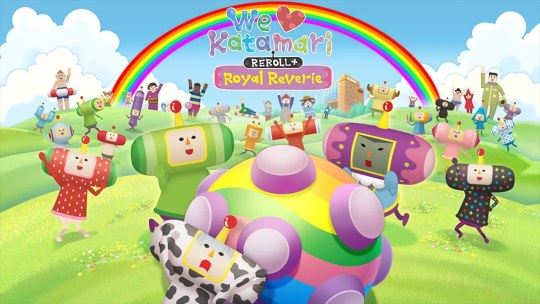
We Love Katamari ReRoll + Royal Reverie
The original We Love Katamari, released on the Playstation 2 in 2005, was already one of my favorite games ever made, so it's borderline unfair of Namco to release an absolutely perfect HD remaster of it in 2023. Namco must've thought so, too, because this was one of my most anticipated games of the year, and I didn't even realize it had released until I happened to see it on the eShop. To the uninitiated, Katamari games task you with rolling up real world objects with your sticky katamari ball, growing bigger and bigger as you go, all with the intent of making your katamari big enough to make stars in the sky. It's a simple yet delightful enough concept on its own to be enjoyed by anyone, but add in an unmeasurable amount of charm and one of the greatest soundtracks ever made, and it's easy to see why this goofy little series has persisted for over two decades now.
For my money, this is the best entry in the series, practically spilling over with creative and fun new ways and reasons to roll over innocent bystanders and animals with a space ball given to you by your negligent, abusive father, who is also basically god. Oh did I forget to mention that there's an actual well told narrative with a genuinely emotional-but-not-saccharine message at its core? Buy this fucking game y'all, I've already seen it for as low as 15 dollars.
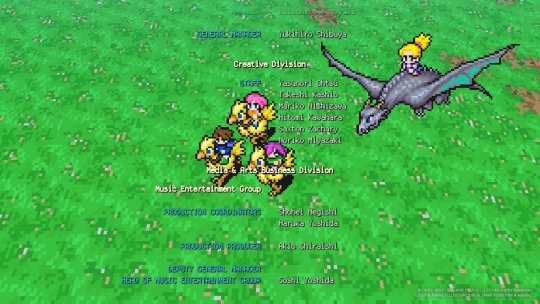
Final Fantasy V Pixel Remaster
Final Fantasy as a series misses way more often than it hits, for me. Yeah I love 7, its remake, 10, and 10-2, but by and large, every other entry I've tried to spend time with has left me incredibly cold (looking at you in particular, 6). Between craving a turn-based RPG and having the flu earlier this year, I decided to take a chance on the pixel remaster version of 5, released on consoles for the first time in 2023. Imagine my surprise when it became hands down my favorite entry in the series, as well as one of my favorite RPGs I've ever played.
Not to say that what's presented here hasn't been improved upon in the past 30 years; Octopath Traveler 2, a game we'll be talking about in my actual top 10, seemed to base its entire design around "Hey remember Final Fantasy 5? Let's make a way more open and less restricted version of that". Still, though, what FF5 was doing as an early Super Famicom game is pretty impressive; boasting a fairly open-ended job and multiclass system that's absolutely begging you to make as many fun combinations as you can imagine with your party members, it's a game that's infinitely more replayable than your average Final Fantasy fare, despite its lacking (but not horrible!) story. I ran through the game with a samurai that could also shoot hoardes of squirrels and bees out of my pockets, so you know it's a great game.
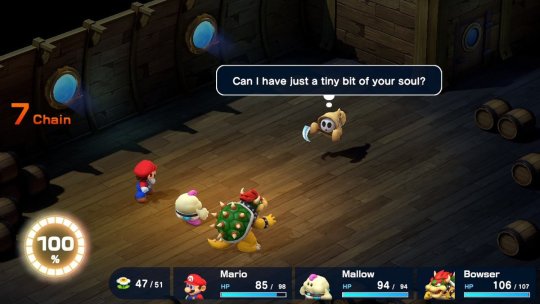
Super Mario RPG
Look, you'll never convince me that Mario RPG and Paper Mario: The Thousand-Year Door aren't both wildly inferior to the original Paper Mario on the Nintendo 64. I've held this belief (and grudge against these other Mario spinoff fandoms) for most of my life, and I will continue to do so. And I say this as someone whose first exposure to RPGs was renting the original version of this game as a seven-year-old!
"It's too simple!" I would always bleat feebly in the general direction of the nearest hardcore Geno fan whenever this game was brought up. "It's a solid blueprint for what was to come later, but largely feels like a rough draft, a 16-bit Final Fantasy with a Mario coat of paint!" And, yeah, I am right about all of those things, and I'll continue to never let any of you forget it. But in 2023, playing this remake of one of Nintendo's most annoyingly favorited fan favorites, I couldn't help but let myself get washed away in its charms. There's no build variety or real "role-playing" to speak of, you can 100% the game in like 12 hours, and you just generally never have to turn your brain on while playing the game at all. Call it softness, call it old age, call it just really being in the mood for a cute and charming little adventure, but I fell in love with this game and its world in a way I never was able to previously. Bring on that Thousand-Year Door remaster next, Nintendo; I'm in a forgiving mood.
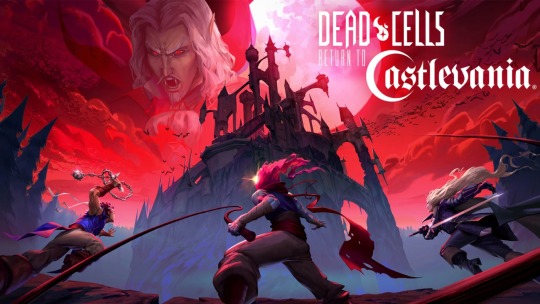
Dead Cells: Return to Castlevania
Speaking of being in a forgiving mood, did y'all know that I thought the original 1.0 release of Dead Cells was incredibly boring? Released in 2018, this sidescrolling roguelite was getting a ton of accolades at the time that had me extremely excited. That's not to say that it was bad, of course; I could see the markings of a well made game, and obviously the game was appealing to someone out there, with all the praise it received. But after 10 hours with it I deleted it off my Switch, thinking I'd never.........return.
It only took five years and a paid Castlevania expansion to make me give this game another look, but I'm glad I did, because I would put this pretty high up there on my all-time roguelite list now. To be clear, most of my issues with this game still remain, mostly that it gets repetitive much sooner than you'd expect of a game with as much content as this does. But instead of cooling on it 10 hours in like I did back in 2018, I got over 60 hours and dozens upon dozens of runs in before calling it quits on Dead Cells this time.
And if you're a Castlevania dork, honestly, just pick this up. There's more than enough love and fanservice here to keep even the most ardent of Castlevania freaks crying bloody tears, including the ability to replace the entire soundtrack with Castlevania songs, most of them the original version but with some new compositions included. Roguelite shredding in a video game hasn't been this good since Hades.
Now...the actual list.
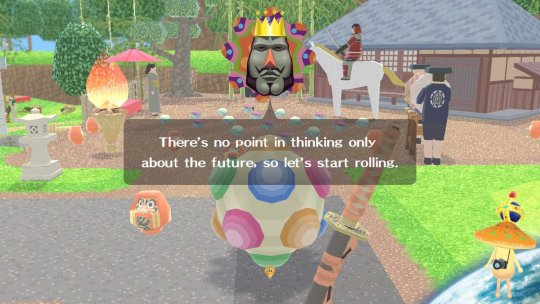
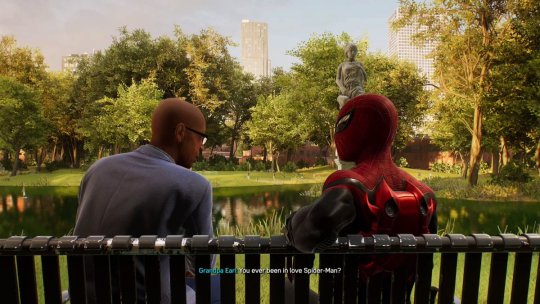
10. Marvel's Spider-Man 2
No one is more down on open world checklist collectathons than I am; the idea of spending over 100 hours playing a modern Assassin's Creed game honestly makes my tummy hurt. And by and large, Spider-Man 2 doesn't stray far from this design template. You run, jump, swing, and glide all over New York City, stopping burglaries and car chases on your way to the next story objective or side mission, leveling up and spending points on various skill trees to level your Spider-Men up to gain new/upgrade old abilities, rinse and repeat. Structurally, this game isn't really doing anything different from the previous two Spider-Man games from developer Insomniac, and yet this entry was an absolute joy to play to me in way those weren't.
Largely, I think it's the pacing of the game. And not just on a macro scale, though I do think that's improved here as well. No, for me it was most noticeable in the combat; no longer are you holding down a button to freeze time and pull up a gadget wheel and having Spider-Man select one of his little science tools to shoot out before doing a few melee attacks and web shots. Instead, all of your gadgets and super moves are activated in real time with different button combinations. It might sound breathlessly dorky, but that simple change really sold the illusion of playing a Spider-Man simulator to me, and not just a Ratchet and Clank game with a Spider-Man skin.
The story I also found to be a wholesale improvement over the last two games, albeit with the caveat that the symbiote and Venom storyline almost never come across as anything beyond tryhard 90s edgelord shit in any form of media. Truly, I think Venom is just a straight up awful character, and is even worse here than usual, and I was exceptionally tired of Peter's gruff mean guy voice by the end of his time wearing the symbiote. Miles more than made up for any issues I had with the Peter side of the story, and with the way the game's story leaves off, I hope to see that character again sooner than Spider-Man 3 in another half decade.
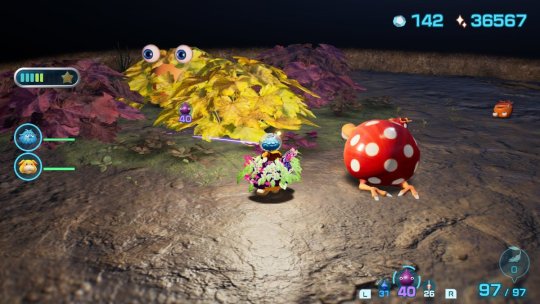
9. Pikmin 4
This feels like Pikmin's big breakout moment as a series. And honestly, maybe my biggest surprise of the year isn't how great this game was, but how many other people were (finally) raving about Pikmin. The fact that it's this relatively low on my own list when most people I know that played it have it near the top of theirs shocks, while also making me feel pretty damn great about Pikmin's future.
From a casual perspective it's pretty easy to see why this has been such a hit for the series. It retains all the charm and cuteness and great gameplay loop of previous games in the series, while making a ton of smart changes along the way. New to 4: a fully adjustable camera that makes you feel way more involved in the action (and see all of the impossibly cute death happening around and to you); a whole host of quality of life changes, like being able to move your spaceship around each stage at will to have a more accessible base of operations; bonafide multifloor dungeons where you're able to soak in some of the best aspects of Pikmin's gameplay without worrying about time passing; "dandori battles", both against the CPU or local rivals where you aim to manage your armies as efficiently as possible; and partner space dog Oatchi, who can help you and your little army of dudes in whatever way you see fit, from battling to carrying to scouting, thanks to an honest to god skill tree. In a Pikmin game! Who woulda thought.
Honestly though, as great as this game was, I can't help but pine for the more complex level and puzzle design of Pikmin 3, as well as the local splitscreen cooperative play of Pikmin 3 Deluxe. That second feature in particular was sorely, sorely missed in our household, as Pikmin 3 Deluxe's sublime coop is some of the most fun I've ever had playing a video game with my wife. Here's hoping the now inevitable Pikmin 5 manages to bring these missing elements home, much like my group of 100 Pikmin carrying an entire watermelon the size of a small mountain back to our spaceship for the day.
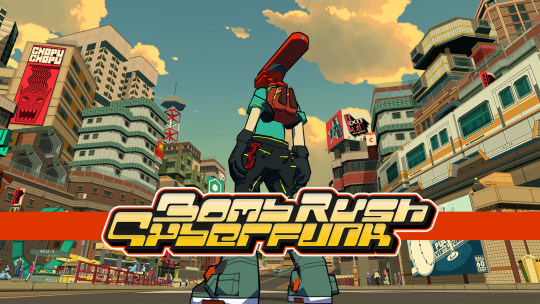
8. Bomb Rush Cyberfunk
Besides just being a great year in game releases, 2023 was also the year where my expectations were subverted many times over. I'd seen plenty of overhyped indie spiritual successors to fan favorite games from the late 90s and early 2000s come and go, so my interest level for BRCF as someone that's never played a Jet Set Radio game couldn't have been much lower. But that's all on me, because if I'd known that this game and its inspirations were essentially just 3D platformers dressed up as a 2002 cyberpunk anime that'd air at 2am on Toonami, I'd have been all over it much sooner.
This game effortlessly pulls off everything I value in 3D platformers. The level designs are masterful and well thought out while still feeling organic instead of just abstract obstacle courses (the game does dabble into the latter at times, and they're some of the most standout moments as well). Being set in a city, it's naturally got a large emphasis on verticality that I think not enough games in this space bother with; I want to feel my stomach drop when I miss landing on a grind rail half a mile in the sky, even if falling from that far has no consequences beyond needing to pull off the platforming section again. And unlike the earlier Tony Hawk games, I'm free to explore each environment to my heart's content, looking for new songs to add to my playlist or spots just begging to be tagged with graffiti. Wrap all of this up in a style and soundtrack that are both just fucking cool, and what else could I really ask for? Well, besides just more of this, please.
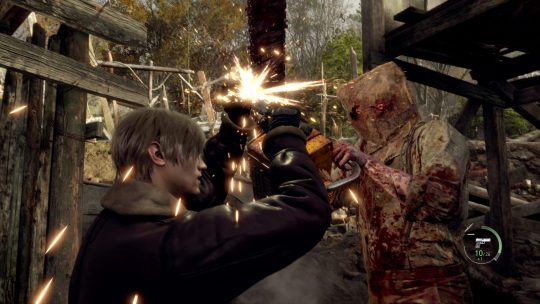
7. Resident Evil 4
In a year full to the brim with remakes, remasters, and revisits, Resident Evil 4 is the one with the most expectations put on it, due to not only the pedigree of the original RE4 (often cited as one of the best games of all time, and surely the catalyst for the modern over the shoulder third-person shooter), but the obscenely high quality of Capcom's other recent remakes from the series; 2019's Resident Evil 2 remake, in particular, being one of the best big budget games of the last half decade, by my estimation. A lot of fans cited RE4 as both "impossible" and "pointless" to remake, though I imagine those same fans were the ones most anxiously waiting for this remake to drop with bated breath.
The end result? RE4 as a remake can't live up to the lofty expectations a lot of people probably hoped it could, not really, but I think it's also one of the most successful video game remakes I've ever had the pleasure of playing, in terms of the fun factor. The gaming landscape has changed a lot since 2005, a lot of that change because of RE4, so what do you even do to make a revisit under a modern lens worthwhile? I think Capcom didn't fully know the answer to that question, as the biggest mechanical additions to this game are the ability to parry the vast majority of attacks with your knife, and erm....craftable ammo? You'll of course find a handful of new enemies and remixed encounters, an even fewer amount of new weapons, and a couple welcome completely redone areas, like a mini open sandbox where you're free to explore the shores of a lake, and a much more clever and interesting version of the brief time spent playing as Ashley.
This might all sound like damning with faint praise, but truly, Capcom's ability to thread the needle here and deliver an honest to god, full on remake of RE4 with modern production values and budget, all without compromising the vision of the original, AND managing to make the remake tonally fit with the current vision of the extended Resident Evil universe? There's some black magic at work here, surely. Or at the very least some ancient parasite bugs at large.
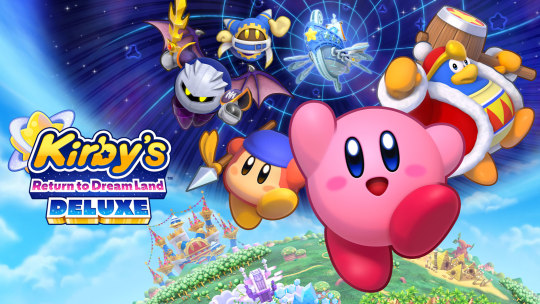
6. Kirby's Return to Dreamland Deluxe
Kirby is the best Nintendo series, and this is an excellent remaster of one of the best Kirby games. What more is there to say? The only reason this isn't top three of the year material is because, well, I played it when it originally released on the Wii. But what's your excuse, coward?
I often hear the refrain of "Kirby games just aren't for me", and I used to humor that line of thinking, largely to avoid prolonged contact with dumb babies. But that dies today, and so will you if you don't stop being a dweeb. High quality sidescrolling brawlers with lite platforming elements and puzzle solving, set to some of the best music ever made for the medium, sporting an adorable aesthetic that's used as set dressing to cover up some of the best backstory and lore this side of Dark Souls? That's not for you? What is for you then, besides being a sad weirdo that still waxes nostalgic about the girl you held hands with once in middle school? Her mom dropped you two off at the theater once to see White Chicks and she never thought about you again. Grow up. Change something about your life. Kirby's got more charm and delight in whatever his puffy mass equivalent to a pinky is than Super Mario Bros. Wonder managed to wearily attempt to slump over its shoulder for an entire game. Y'all should be ashamed.
...
I dunno what this bit is anymore, so let's pivot back to normalcy. Yes, I know, I know, I'm the Kirby guy. It's my favorite gaming series, hell, maybe my favorite franchise in any medium period. But I'm also not blind to its faults and missteps, such as 2018's Star Allies. When I tell you that Return to Dreamland Deluxe, a remaster of a game I played over a decade ago, now with additional content, is one of my favorite games of 2023, I really mean it. The base game was already excellent, and the first entry of the modern era of Kirby, under the helm of Shinya Kumazaki. A new cel shading-adjacent rendering, coupled with completely new abilities Sand and Mech on top of perhaps the overall best set of copy abilities in a Kirby game, really help make the game feel fresh; Sand's combo and damage per second capability in particular is through the roof, while not feeling imbalanced.
The meat of the new content, however, is the new epilogue, in which you play as fan favorite character Magolor. Magolor plays very differently from Kirby, eschewing copy abilities and quicker movement for magic, and the game also introduces an honest to god skill tree into the series. This mini adventure culminates in not only what is probably my favorite boss fight of the year, but an in-universe lore explanation for why Magolor shows up in spinoff Kirby games adorned in green instead of blue and trading in crystal apples.
That may sound goofy and extremely in the weeds, and it is, but for a man in my mid-30s that's been beyond bored of Nintendo's refusal to do any significant kind of world building or storytelling in almost any of their mainline games, Kirby manages to continuously surprise and delight me with both its gameplay and universe in a way no other Nintendo game is even interested in trying. The Super Mario games should take heed.
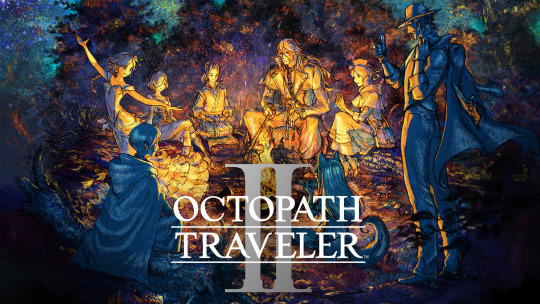
5. Octopath Traveler 2
I played both demos for the original Octopath Traveler back before that game came out, and to say I didn't like it would be an understatement! The writing was at best flat, and at worst, overtly sexist (and that was just from a demo!), I found the battle system to be clunky, and the thing most people praised it for, its "HD2D" approach to graphics, I found quite ugly; it seemed to be throwing away any attempt at an actual artstyle in favor of cranking a bunch of photoshop filters up to max and letting people ooh and aah over some particle effects and oversaturated lighting. Great soundtrack, at least.
I couldn't tell you what drove me to check out the demo for 2, but I did, and instantly, something clicked for me that didn't in my limited experience with the original. Full disclosure, I haven't finished this game yet, and in fact I don't think I'm even halfway through. And that's a shame, because I think it could honestly rise even higher up this list, based on what I've already played. The battle system is fast and snappy, as long as I'm paying close enough attention to all the information on screen, like enemies weaknesses and my current BP situation. The overworld feels far more inspired by popup books than I remember 1's world feeling like, while still retaining the gorgeous battle sprites that the original excelled in. The soundtrack is an all-timer, to put it lightly. Even the writing for the characters, while still nowhere approaching the rest of the game's strong points, feels less like it works exclusively in lazy caricatures and broad stereotypes. Yeah there's a merchant character named Partitio from an old west-styled silver mining town, and yes I was just as worried about that fact as you probably are reading that sentence. And yet, Partitio has honestly become one of my favorite characters of the year, his desire to use his mercantile skills to ease the burdens of the working class only being outshone by the electric guitars and saxophone in his theme song.
What truly impresses with Octopath Traveler 2, though, is its sheer openness. The world is, while not quite your oyster right from the start, pretty dang free form for the most part, allowing you to go recruit your party members and explore towns and monster-filled wildlands in whatever order you see fit. This extends to the job system, which affords you the most freedom to truly make whatever kind of team you see fit I've ever seen in a game of this kind. I'm currently multiclassing my cleric, Temenos, into a scholar, and I've rarely felt cooler/dorkier at the same time, wielding nearly every magic type offered in the game at once with one world-weary church inquisitor. Just typing up this entry has got me itching to get back to the game, hoping to discover even more jobs to multiclass the rest of my crew into.
Take it from me, someone who as little as a few years ago felt pretty much over turn based RPGs, especially those coming out of Square-Enix: this game is very worth your time, regardless of your feelings towards the series, or even genre as a whole.

4. 30XX
In a year chockful of exceedingly excellent roguelites (Dead Cells: Return to Castlevania, Risk of Rain Returns, Cobalt Core, Vampire Survivors, just to name a few), 30XX stands tall above the rest for me, not just in terms of quality, but also in its ability to completely take over my gaming time for a couple months. This has all the trappings you expect from a game with the structure of a roguelite; permadeath resulting in having to start your entire run over, unlockable items and stat upgrades purchasable with currency carried over from the run you just died in, powerups that you collect during a run to give yourself a fighting chance (and which force you to make on-the-fly decision making about how best to synergize your build), and a white knuckle intensity that makes the runs when you really start to shred feel all the more rewarding, albeit no less anixety inducing.
What ends up separating 30XX from any other game in this admittedly crowded space is that it's essentially a roguelite take on Mega Man X4, the beloved Playstation 1 entry in an even more beloved series. X4 was the first game that really fleshed out lightsaber wielding cool guy Zero as a fully playable character, for the first time letting you play through the entire game as both him and series protagonist X. 30XX makes no bones about its inspiration; Nina, the blue one, is the X equivalent, meaning you'll be primarily shooting enemies with your arm cannon, while Ace, the red one, slices and dices with an energy sword, just like Zero. Likewise, the (absolutely gorgeous) spritework and extremely catchy soundtrack are doing their best to evoke the oft overlooked aesthetic and sounds of 2-D games from the Playstation 1. Rounding out the package are full-featured coop, both local and online, community made levels, daily and weekly seeded runs with leaderboards, and the promise of even more updates, including new characters(!!).
Even Mega Man series staples you might not expect to show up in a roguelite take on the formula end up being major focuses of the game, like gaining new abilities from defeating bosses. The game even takes that mechanic a step further, letting you mix and match two abilities to form completely new ones, like combining your black hole and homing lightning abilities to create a barrage of homing lightning strikes emanating from a swirling void. Or, in true roguelite fashion, you can even forego an ability from a boss altogether, if a different reward suits you. And that's just if you're playing as Nina! Ace gets an entirely different set of abilities and mechanics, all built around melee capabilities and close quarters combat.
If any of this sounds appealing to you, you're probably now asking yourself "why have I never heard of this game?" And I truly can't answer that, as this feels like it should already be a revered indie darling on the level of Shovel Knight or Super Meat Boy. If you're a Mega Man fan, please do yourself a favor and check this out. There's even a separate mode that minimizes the roguelite elements, including a removal of permadeath, if that suits you! This is a better Mega Man X revival than you'll likely ever see out of Capcom, if a day even ever comes for that at all. It also happens to be better than just about any official Mega Man game Capcom has ever put out, as well.
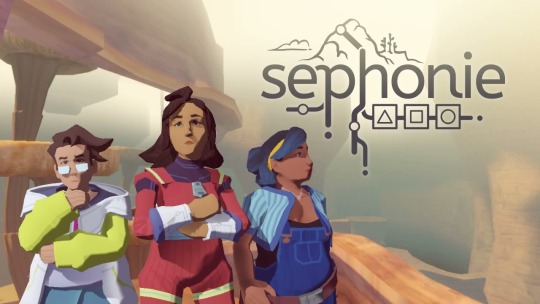
3. Sephonie
My personal gaming identity feels inexorably linked to Analgesic Productions, the two person development team that's putting out the best indie games most people have never even heard of. The only thread on Resetera I've ever made was solely for the purpose of evangelizing Anodyne 2: Return to Dust, a game that resonated so hard with me the effects are still reverberating outwards, as my habit of recommending that game anywhere I go has helped me forge genuine friendships (and probably gotten me on to a few government watch lists). Even the Ocean was the third game my friends and I covered in our games club, and was by far and away the best talk I've ever had about video games, sparking a creative spirit in me for months afterward. Marina Kittaka and Melos han-tani make some real affecting fucking games, is what I'm saying, and the idea of trying to sum up what makes Sephonie so special (and maybe even my favorite of their impressive work) is a bit daunting.
At its most base level, Sephonie is a 3-D platformer not dissimilar from the Tony Hawk Pro Skater series, or even the above Bomb Rush Cyberfunk, albeit without any wheels; instead of tilting the analog stick to move at whatever angle you want, you hold a button to run forward, the stick's sole purpose being to make adjustments to direction. Your mobility on its own isn't very versatile, and getting around requires careful and clever use of the environment to do wall runs and jumps, grabbing giant dandelions to float, landing on mushrooms to bounce, etc.
Even for a self-proclaimed platformer guru (maybe even especially for one!), the movement feels unwieldy or even downright intimidating at first. But in Analgesic we trust, and by the end of my initial 8 hour or so playthrough of the game, I felt like a parkour god, able to pull off complex maneuvers that I would have never been able to dream of in the opening sections of the game. Coming to grips with the controls and eventually mastering them was one of the biggest joys I experienced in video games this year; don't go into this expecting s Super Mario Odyssey-level of 1:1 control that lets you immediately start flowing through the environment like a hot knife through butter, because that's decidedly not the point here. Despite what the past few console generations have taught us, we don't need standardized controls across every game, as all that would serve to do here is sand down the distinct personality and learning opportunities presented in Sephonie.
Rounding out the gameplay are linking puzzles. The three playable characters are researchers who have come to the remote island of Sephonie to study its unique animal and plant life. Linking with each new lifeform you discover presents you with tile-based block puzzles, which end up being a nice change of pace from the platforming. As a testament to just how much love and care was put into Sephonie, the vast majority of these linking puzzles each have unique mechanics, be it teleporting tiles, tiles that are blocked and need busted open by matching blocks on adjacent tiles, tiles that multiply your point total, creatures that travel the puzzle and alter when and where you're even able to place your tiles, etc. With some tweaks, the link puzzles could be a whole game unto itself, and it's really impressive!
That's all well and good, but the main reasons I come to Analgesic games are the unbelievably good writing and even unbelievably-er soundtracks, and both are where Sephonie truly shines for me. Unfortunately, to talk too much about the story here would be bordering on a cardinal sin, and you're better off listening to some of the music on your own. Why not try the entire playlist here?
The previously mentioned Anodyne 2 opens by telling you it's a game about life. That's a bit of an understatement for me with Analgesic's games in general, but Sephonie might be the best example of "a game about life" that I can think of. As someone that grew up in a midwestern town full of basically nothing but nothingness and corn, the Bloomington, Illinois section of the game is without a doubt the most beautiful segment of any game I've ever played, and the main thing I keep coming back to with this game even six months later. I've never been so simultaneously full of nostalgia, regret, disdain, self-loathing, and fond memories as I was while platforming around an abstract dreamscape version of a midwestern town right off the highway. And I don't think I've ever related to a character in any fictional work as much as I did when Amy was talking about feeling lucky she was born in a small town, because it made learning how to drive much less intimidating.
If there's one game on this list I would beg someone to give a shot, it would be Sephonie. Hell, if there was one game I could force anyone to play, Sephonie might be taking that spot as well. As a thorough contemplation of what it means to be alive, and what connecting with one another can truly mean and feel like, there's no better work of art out there today, and certainly not one anywhere near as fun, either.
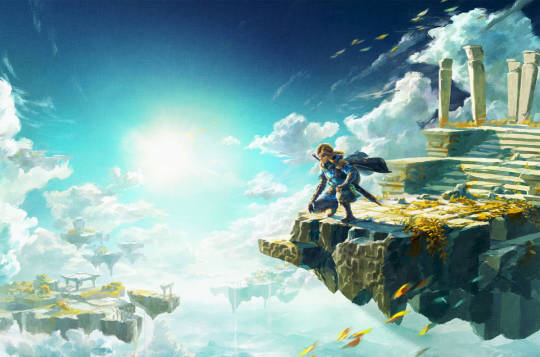
2. The Legend of Zelda: Tears of the Kingdom
What can I say about TotK that hasn't already been expressed in a million think pieces, essays, and podcasts across the entire internet by now? As a direct followup to 2017's stellar Breath of the Wild, I had concerns going in - would the magic still be there? Is exploring the same incarnation of Hyrule going to be fun when I know all of the broad strokes already? Are the bosses not going to suck this time? The answer to all of these is a resounding "absolutely", but there's so much more on offer here.
Everything in this game makes BotW feel like a rough draft, a sentence I never in a million years thought I'd be typing prior to getting my hands on the game. Any mechanic you can think of that you loved in the prior Zelda entry is either improved upon here or excised for something infinitely more interesting. The Sheikah slate abilities from BotW feel not only basic, but downright boring compared to the powers on offer in this sequel. Who cares about being able to spawn bombs at will when I can fuse batwings to arrows to make them fly further? Or just swim through through the damn ceiling!? To say nothing of the fact that you can build basically anything your imagination can spring into existence, from cars to rocket ships to pilotable mechs to lawn mowers. And it all....just....works, somehow, not only tonally with the game's world, but also from a game perspective. The game even lets you have five CPU controlled companion characters out at the same time, every one acting independently to take down enemies near you! It feels like your Switch is going to collapse under the weight of this game's ambition at any moment, and yet I put over 300 hours into the game with not a single crash in sight.
If there's one thing I can complain about, it's that the story feels like an actual afterthought, to the degree that it actually bummed me out, even as someone with rock bottom expectations when it comes to story in a Zelda game. The marketing REALLY hyped up the return of longtime series antagonist Ganondorf, and he just....kind of has no motivation for anything he's doing here. I'm not asking for much, and there are genuinely great character moments lightly sprinkled throughout the game's runtime, mostly with princess Zelda herself. But I couldn't help but imagine how much harder some story beats could have hit if Nintendo, again, actually even attempted to give people the tiniest but of anything to chew on when it comes to the stories they're telling.
But whatever, I've got a catapult to build to launch me and a korok buddy up a damn mountain.
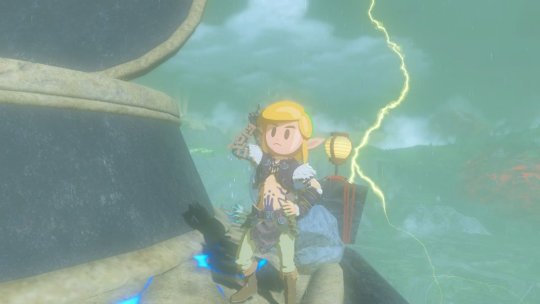
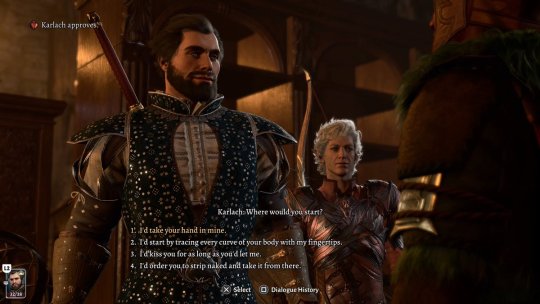
Baldur's Gate 3
Like most people who cut their gaming teeth on more straightforward action fare on consoles, the term "CRPG" (computer RPG) seemed beyond out of reach for me. Dice rolls? Skill checks? Playing as a charisma based character to persuade bosses to kill themselves instead of having to fight them? READING!? Uh, I'm an American, thank you very much; I like my video games game-y and my gravy portion extra, ma'am, and I don't have the patience to think about probability and stats.
So imagine my surprise when, after my wife started playing the game on her own, I found myself itching to get into the character creator myself. Not the moment to moment gameplay, mind you, but the character creator, a step I'm notorious for getting through as fast as possible so I can start "actually playing", even if I'm stuck with a boring default character named Goober. Something about watching my wife agonize over which horn style and subrace to go with on her tiefling bard, which hairstyle and color looked cutest and would match her vision of how she was going to roleplay in the world, stirred something in me I didn't know existed. While she was perusing all the customization options, I spied the class "monk" and a race called "dragonborn", some anthropomorphic dragon people with a lot of pretty color options for their scales that also affect your elemental resistances. "Yes," I thought to myself. "I'd like to make a humanoid lizard dude that punches shit to death. I'd like that very much". And before my wife was barely out of the tutorial section on her first character, we were already backing out to make a second save file where we would play the entire thing cooperatively, fretting over the decisions and romance options each step of the way together. I got to make my silverscale (that means he's got ice powers, baby) dragonborn monk, Shikai, and the following 300+ hours (and counting!) with Baldur's Gate 3 have been the most fun I've ever had playing a video game.
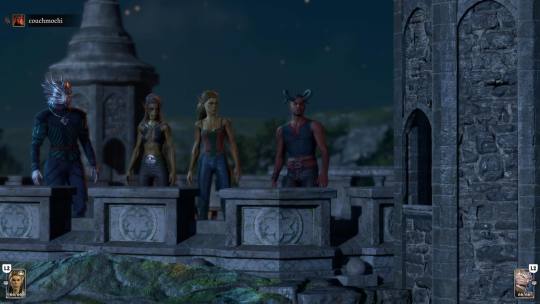
Would I be as gobsmacked with the game if I was intimately familiar with the genre? Maybe not, but I guess that's my point. Living with my wife and playing games together has completely changed how I engage with a lot of them; Animal Crossing was basically a cute chores and debt repayment simulator with a dash of fishing on the side until watching my wife play the game for thousands of hours taught me the joy of decorating.
Elden Ring was her first foray into the Souls-like genre; she had a similar reaction watching me play the opening hour of Elden Ring as I had watching her in the BG3 character creator, growing increasingly frustrated as she watched me putz around making a boring dexterity based samurai character when what she wanted to see was some faith-based holy magic in action. Despite my love of Souls-likes, I had always just made standard melee based characters in them, usually katana wielding doofuses; I'm an American, I don't know a lick about incantations, I HATE thinking, and please keep your Wes Anderson movies to yourself, ma'am.
But as I saw how much fun my wife was having shooting fireballs and throwing lightning bolts at enemies, I eventually started speccing my dexterity character into intelligence as well, making a samurai sorcerer, undeniably the only thing cooler than a normal samurai. That's not to say that playing Elden Ring with a melee exclusive character is wrong, but just that with a touch of curiosity and willingness to take the tiniest step outside of my comfort zone, a comfort zone I didn't even realize was as tiny as it was, I opened up a whole new way of enjoying a game I already loved playing. Learning to enjoy Baldur's Gate 3 feels like I've opened the door to an entire new avenue in my mind, waiting for me to fill it with opinions about games I've been avoiding my whole life. I'm gonna actually make a concerted effort to finally play stuff like Mass Effect and Disco Elysium sometime soon, two games I had preemptively decided years ago were just "not for me", and I'm genuinely excited about it.
This entry is so long already, and I didn't even mention anything about how the game actually plays (it's the best turn-based battle system I've ever experienced, to say nothing of the freedom you're afforded to solve every single scenario presented to you in the game.
Or anything about the characters (this is the best cast of characters I've seen in any medium, and they feel like genuine friends of mine in a way that no other game has ever come close to feeling).
Hell, to save time and my poor fingers: Baldur's Gate 3 is without a doubt the best video game I've ever had the pleasure of experiencing. And as little as a few months ago, my only thought towards it was "that game probably isn't for me".
Don't make my all too human mistake; check out shit that looks interesting, take the chance to expand your mind and your taste. They're not all gonna be Baldur's Gate 3-level bangers (what is though, really), but you truly never know what you're going to discover. And you might even find yourself open to a whole new avenue of life to enjoy that you had previously assumed was just for mega dorks.
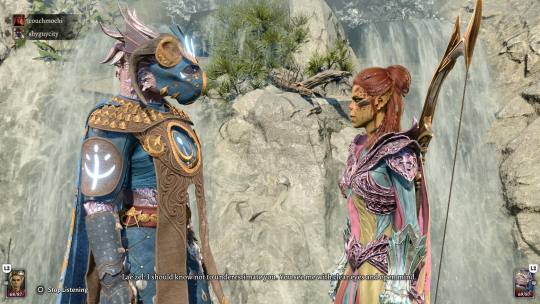
5 notes
·
View notes
Text
Goty 2019
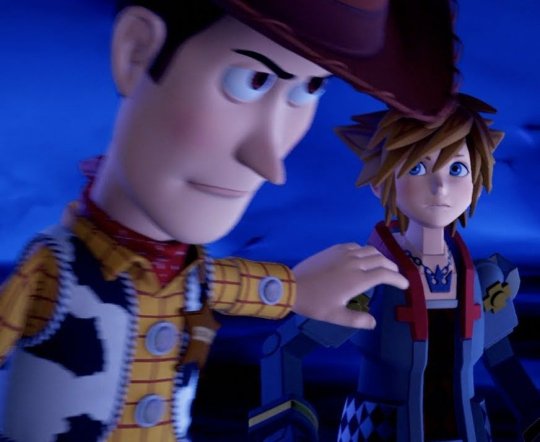
Hey. It’s game of the year 2019 baby. By now you know the kinda justice we seek on these streets, so no long-winded introductions, except to remind you that these aren’t reviews, and honorable mentions have been moved down to the bottom this year because we're evolving.
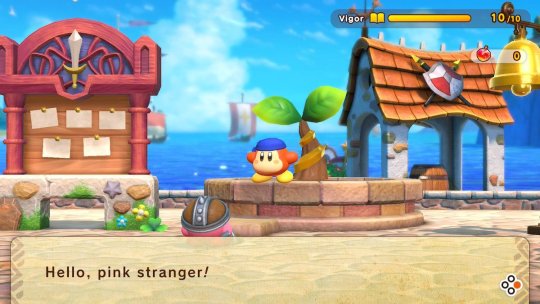
12. Super Kirby Clash (Switch) - A free to play online Kirby spinoff centered around combat that features microtransactions sounds like an awful idea on paper, and yet it’s somehow my most played multiplayer game of 2019. I won’t try and present the game as anything more than what it is, which is basically a very (very very very!) simplified, arcade-y Monster Hunter game with a very (very very very very!) cute aesthetic. But as a recent convert to Monster Hunter and a longtime Kirby lobbyist, it turns out that that’s all I need to play a game for nearly 100 hours. The four classes all have varied abilities, gameplay and roles to play, and there’s nothing more satisfying than freezing time as the mage in the middle of an enemy’s jumping animation. I found the microtransactions to be completely fair, as I spent around 10 dollars total on the game and never found myself hurting for apples (the game’s main currency and the only one you can buy with real money) to upgrade my equipment. This isn’t a game I would be able to recommend to everyone, but if it’s your type of thing then it’s going to be very much your type of thing.
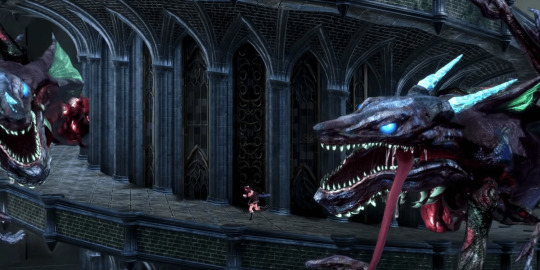
*Image credit: 505 games
11. Bloodstained: Ritual of the Night (Switch/PS4/Xbox One/PC) - Despite horrible first impressions from my backer copy of the Switch version, Bloodstained really ended up delivering the true Castlevania: Symphony of the Night successor it promised to be, and I had a fantastic time with it (after trading in my Switch version and begrudgingly purchasing a PS4 copy). While I love almost all of the Castlevania games in their own ways, even the best entries post-SotN didn’t end up feeling much like SotN. Bloodstained, meanwhile, wears its inspiration on its sleeve. Or rather on its wolf hood and gas mask combo.
Obscure, bizarre, and goofy secrets are around every single corner of the castle. I mean, like, really esoteric ones that I can’t imagine having found without a guide. From the myriad of hidden (and very challenging!) boss fights, to trophies popping for playing a piano while having a fair familiar out to entire sprite based areas, the surprises never stop being thrown at the player. It adds so much goofball flavor to the game that’s missing from just about any other entry in the genre, and it does the brunt work in giving this game its identity.
Not only are the secrets plentiful and good, but the combat is also excellent; much like a couple entries in the latter Castlevania games, just about every single enemy in Bloodstained has a chance of dropping you a shard upon defeat, and each one gives your character Miriam a new ability. Some of these are simple passive buffs, while others completely change your combat options. From ghostly portrait guardians to giant dentist drills coming out of your hand to summoning disembodied dragon’s heads, the shard system is never not entertaining, and leaves the player so much room for experimentation and realizing their ideal build it’s actually a wonder they were able to bug test this thing at all. And truly, the main issues holding Bloodstained back from true greatness are its technical issues. Which is a shame, and seemingly an issue on all platforms. But if you can handle a hard crash here or there, you’re in for a treat.

10. Fire Emblem: Three Houses (Switch) - I never thought I would care at all for any Fire Emblem game. Certainly, I saw the appeal of them prior to Three Houses, but they just never seemed like something I would want to devote a lot of time to. But putting the game in a school setting and recontextualizing your soldiers as students really made a huge difference for me, and I bonded with the characters in the game in a way I normally reserve for my Pokemon teams. And unlike Pokemon, I can marry my students, which is beautiful and horrifying.
There are definitely issues with Three Houses. A silent protagonist has no right starring in a game like this, especially with all the emotional story beats the game is trying to pull off. The writing in general was also all over the place, ranging from odd decisions with both the characters as well as the overarching story (some of this is remedied by replaying the game multiple times and going down different routes, but I put 60 hours into the game and couldn’t even finish two paths, so that’s a bit unrealistic). Lastly, the monastery that serves as your school needs just a tad more variety in activities to do in between the battles, as what started out as my favorite part of the game became a chore for the last dozen or so hours.
All of that said, I am anxiously waiting for the sequel, as the foundation that’s been put down here could lead to something truly special. As it stands, this is the best secret Harry Potter game ever made, and that alone is going to have a lot of appeal to a lot of people.
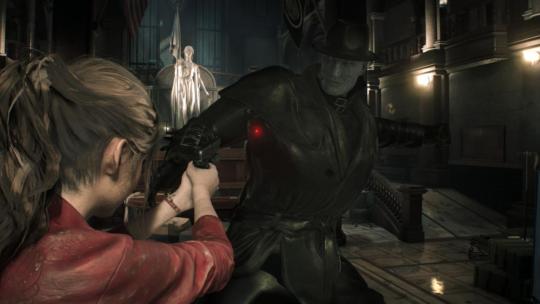
*Image credit: Gamespot
9. Resident Evil 2 (PS4/Xbox One/PC) - Truly, I have never been more stressed out when playing a game than the first time I had to start dealing with Mr. X. Yes, on each subsequent playthrough (of which I did many!) and even encounter he became less of a threat and more of an annoyance, but much like a good horror movie, that first time will remain embedded in my brain as one of my most memorable gaming moments.
And that kinda sums up Resident Evil 2 as a whole for me. An amazing, unforgettable start in the police station, followed by a somewhat middling second act in the sewers, and ending on kind of a weirdly short whimper in a very tonally different setting than the rest of the game. And that’s without getting into how disappointingly similar the “B” playthroughs of either character were to their “A” counterparts. It was all still great, mind you, and the gameplay and scares remained excellent throughout. But man was that first act in the police station something truly special, and I’m hopeful that the eventual remake of 3 keeps more of that tone throughout.
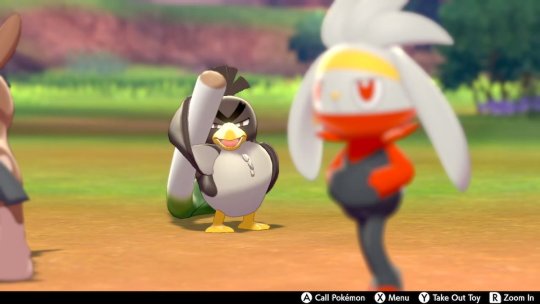
8. Pokemon Sword/Pokemon Shield (Switch) - Cutting hundreds of Pokemon was pretty close to the bottom of my list of concerns going into the latest Pokemon. The series hasn’t really grabbed me in a major way since Black and White on the DS almost 9(!) years ago, and I had largely accepted the idea that I was finally growing out of the franchise. While this 8th generation of Pokemon titles is far, far from perfect, and in fact doubles down on a lot of the aspects I don’t like about modern Pokemon games, Sword has become my favorite entry in the series in a very long time.
This is down to two things: my favorite batch of new Pokes the series has ever had (Galarian Farfetch’d, my prince............) and the introduction of multiplayer coop content with raids. The former is subjective I suppose (but seriously, Galarian Farfetch’d), and the appeal of the raids is going to be dictated by how into repetitive content you are and if you have people to raid with. I’m fortunate enough to love repetitive tasks in video games, especially repetitive tasks that amount to fighting and capturing giant monsters for rewards, and to have a partner to enjoy those repetitive tasks with. We lost entire weekends to hunting down new raid opportunities in Sword, and this feels like the first major step the series has taken in nearly a decade to try and reengage me in a meaningful way.
And don’t get me wrong: Pokemon has a long way to go to bring me entirely back into the fold. The dungeons are nonexistent, the routes are largely completely straightforward affairs, the post game content is so light that “barebones” feels like a generous descriptor, and the performance issues in the wild area (the game’s more open, free roaming space) are inexcusably awful when played online. I hope by the time the 9th generation games roll around that we’ll get a bigger advancement than what’s been seen here, but to me, this feels like an all around better made product than any of the 3DS entries, with or without Galarian Farfetch’d.
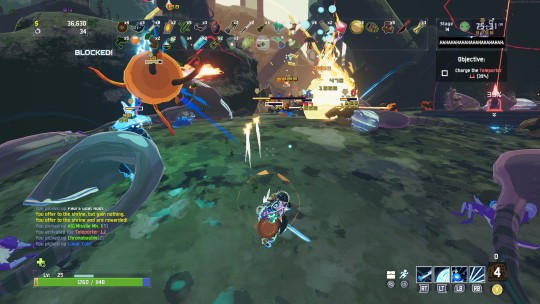
7. Risk of Rain 2 (Switch/PS4/Xbox One/PC) - The original Risk of Rain is a personal all-time favorite, so seeing the developers successfully make the jump from 2D to 3D while still maintaining everything I love about the first game is a truly remarkable feat. Both games sport essentially MMO-lite combat with abilities dictated by cooldowns and items that you get from chests and bosses, with rogue-like progression and permadeath. That’s a lot of jargon even for me talking about video games, so essentially: keep shooting things and powering up by grabbing items and defeating bosses, and when you’re dead you’re dead (bar a specific item), rinse and repeat.
It’s deceptively simple while being endlessly replayable. The true fun comes in when playing with other people, as every character plays completely differently, and figuring out builds for each person on the fly is extremely fun and rewarding. This also means that if you start getting bored of one character, simply play a different one on your next run. Add in an extremely moody sci-fi aesthetic (including one of my favorite soundtracks of the year) and that’s Risk of Rain.
The main issue with Risk of Rain 2 at this point is that it’s simply unfinished, and won’t even have an actual ending state until spring of 2020. This doesn’t hamper my enjoyment of the game much, hence it being on this list, but I imagine a lot of people would be bothered by it. The developers have done a great job of updating the game at a decent pace so far though, and every major patch has come with a new character, among a ton of other things. And if I’ve already gotten this much enjoyment out of an early access title, it’s exciting to think about a feature complete version down the line. And hopefully that feature complete version of Risk of Rain 2 includes the Chef character from the first game *ahem*.
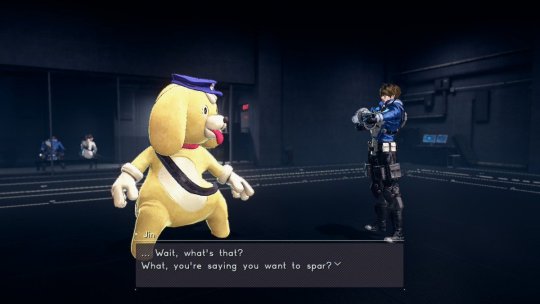
6. Astral Chain (Switch) - In a year full of some real dang weird yet shockingly great games, Astral Chain stands tall as probably the weirdest surprise of them all. You’re a future cop fighting invisible ghost demons from an alternate dimension with your own invisible ghost demon chained to you through some high tech handcuffs. That’s just the first half hour of the game, and it ratchets up the anime nonsense many magnitudes over in the course of its 20ish hour runtime. And it’s great and stupid.
It’s not just the plot that’s over the top, though. Coming from developer Platinum Games, renowned for their nonstop super sweaty action portfolio, Astral Chain spends just as much time tasking the player with exploring its world, characters, and lore as it does asking you to punch enemies the size of skyscrapers (or bigger). It’s a formula that works shockingly well, as I found myself enjoying the downtime segments just as much, if not more, than the action portions of the game. And the action that is there doesn’t really play like your typical Devil May Cry or Bayonetta, either; the player character, while critical to pulling off combos and the like, is not your primary damage dealer, with that role being fulfilled by your five “legions” (the aforementioned ghost demon buddies), all of which have different strengths, weaknesses and abilities. The gameplay ends up feeling kind of like a realtime Pokemon game by way of JoJo’s Bizarre Adventure, and no sentence I’ve ever written has been as cool as that one.
I do think Astral Chain falls a bit short in the combat department, at least compared to other games in the genre. It’s a bit too simplified, despite how crazy looking and overwhelming the actions you and your legions end up doing can be, and I think that the obligatory Platinum-style grading system in this is very poor - it doesn’t seem to grade overall performance so much as it just wants you to constantly be switching your legions in the midst of battle. Which is a great lesson to teach your players, but I would also like if anything else about my combat performance seemed to have significant weight on my grade. Having said all that, it’s a flaw that I found much easier to overlook in the midst of battle when I sent my wolf legion ahead of me, biting and tearing its way through a cluster of enemies, while I hung back inside of my punching legion, finally able to fulfill my years-long Star Platinum “ora ora ora” fantasies.

5. Anodyne 2: Return to Dust (PC) - There’s a lot going on in Anodyne 2, and I fear trying to describe it in words, not only because of all the jargon I’d inevitably have to use, but also because I’m not sure I can do the game justice. To that end, here’s a brief trailer of the game to get you started:
youtube
If you find that trailer at all intriguing, Anodyne 2 is definitely for you. And if you’re still skeptical, know that the game has far more to offer than just its (beautiful) low-poly aesthetic. While visually it’s obviously most evoking Playstation 1 era games such as Mega Man Legends, in terms of the tone of its writing it strikes a pretty peculiar balance between Earthbound and Nier: Automata (names I do not invoke lightly!). The visuals aren’t just an aesthetic choice, either - throughout the game you find yourself in 2D overhead areas, solving puzzles inside of the minds of other characters, and these varying layers of abstraction serve to further the game’s message and atmosphere. And it’s all of these things combined that pushed Anodyne 2 over the edge of “memorable” and into the realm of “haunting” for me.
It’s a game that wants to be played and experienced by everyone; you can tell how much love was put into every single corner of the world, every line of dialogue, and each and every single goofy joke. Steven Universe (another seeming inspiration of the developers) is the only other piece of media that has reminded me of just how lost and alone I’ve felt at various stages of life, while choosing not to dwell on that and instead using it as a launching pad to remind me of just how far I’ve come. As the game itself says, Anodyne 2 is a game about life, and I’ve rarely come across one that felt so full of it.
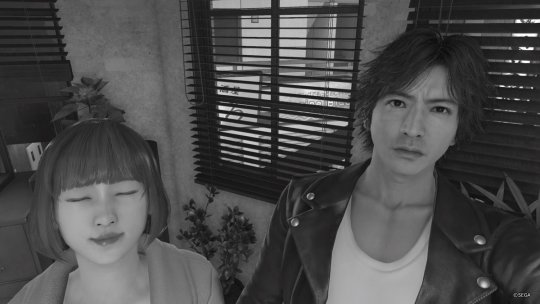
4. Judgment (PS4) - With the release of Yakuza 0 a couple of years ago, the Yakuza games went from a series I was vaguely aware of in my periphery to maybe my all-time favorite video game comfort food. They’re silly, melodramatic, sad, and beautiful, tonally swinging back and forth like a large imposing guard wildly trying to hit Kiryu with a couch section. Most importantly, they manage to feel heartfelt and personal in an age where high budget games seldom feel anything of the sort. I was initially hesitant, then, to play a spinoff that threw aside its entire cast of established characters for a crew that dabbles in detective and lawyer work; I didn’t think there was much of a chance that this new band of very handsome crimeboys with hearts of gold would be able to compare to Kiryu, Majima and the like. How glad I was to be wrong, as Judgment is now maybe my favorite of the Yakuza games I’ve played.
By pulling further out (but not completely away) from the culture of organized crime as the central driving factor of the story, you no longer need to memorize a dozen different yakuza organizations and all of their subsidiaries and patriarchs within, nor do you have to try and remember which side is feuding with who. And that isn’t to say that the story doesn’t have just as many twists and turns; it does, and despite the larger scale of the stakes, ends up feeling more focused and personal. I also found it easy to bond with the two main characters, Yagami and Kaito, as not only do their personalities play off of each other very well, but they simply share more screentime together than I’ve ever seen Kiryu get a chance to do with anyone. Truly, the story ended up being one of my favorites in the entire medium, and I fell in love with the characters to the point where I got misty eyed during the credits.
With regards to gameplay, it’s a Yakuza game. Which means a lot of running around Kamurocho, talking and shopping and playing minigames and brawling. Since the player character in this entry is a detective, there are various mechanics and events related to the profession, such as investigating crime scenes and tailing suspects, but they’re by far the weakest part of the game, and you shouldn’t come to this game looking for incredible detective gameplay. Instead, come to the game for literally everything else it offers, because it’s a fantastic experience all around, and a great jumping on point for anyone unfamiliar with Yakuza.

*Image credit: Steam user Symbol
3. Sekiro: Shadows Die Twice (PS4/Xbox One/PC) - Frankly, I did not much care for Sekiro for the majority of my first play through. Specifically, I dreaded its boss fights. To go from the sheer joy of being able to dispatch a courtyard full of enemies in any way I pleased in the game’s relatively free form stealth sections, to being killed in a matter of two or three hits to every single boss and miniboss was frustrating; how could I not groan when I started that duel with Genichiro at the top of the castle, knowing full well that I was going to be stuck there for a few (or more) frustrating hours? It wasn’t until the fight against the protagonist’s father figure, Owl, hours later at the same location as the aforementioned Genichiro fight, that something clicked. It only took around 30 hours, but suddenly, instead of approaching the situation like a Dark Souls or Bloodborne boss, I was not only being defensive, but I was being aggressively defensive, parrying nearly every single blow. Suddenly it was me standing in place, baiting out my opponent’s attacks only to throw the force of his own momentum back at him. Suddenly combat made sense in this damn game. And suddenly I was dead again in a quick three hits after inhaling some magic gas that prevented me from being able to heal. But that was ok! Because suddenly this game was amazing, and suddenly I had completed it four times and adored every second of it (except for that fucken four form final boss with no checkpoints).
I still stand by my (and a lot of other’s) original complaint that the disparity between the freedom offered in the rest of the game compared to the unflinchingly rigid roadmap you have to follow in fighting the bosses is jarring game design, and it’s very fun to imagine a version of Sekiro that lets you approach bosses any which way you like. On the other hand, no other game that I’ve ever played, not even Sekiro’s predecessor and my favorite game of this console generation, Bloodborne, has come anywhere close to making me feel this cool when fighting bosses. And that’s a mighty impressive accomplishment on any game’s part, speaking from the perspective of an overweight, sweaty, hairy, very uncool man.
But really, fuck that final boss though.

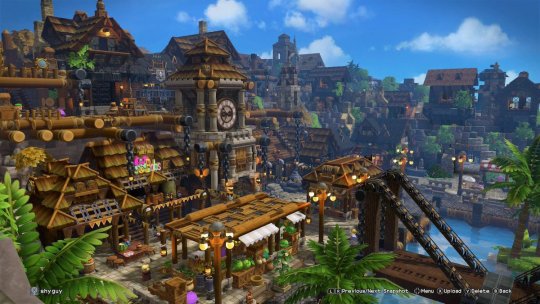
2. Dragon Quest Builders 2 (Switch/PS4/PC) - When we were around 10-years-old, one of my best friends, Patrick, used to host fairly regular Lego-building sleepovers, where everyone built whatever they wanted, and our creations were then showcased to the rest of the group. Being that the group consisted entirely of pre-pubescent boys, this meant building various robots or cars, all of variable quality/ability to stand upright. During one of these nights, in lieu of the usual deathbot piloted by the ghost minifig, I instead constructed a little bunker for the ghost - a place where, after a long day of being forced (by me) to pilot his mech suit and commit unspeakable acts, he could hang up his ghost hat and be forced (by me) to ponder the morality of his actions. It was just a tiny little room with the necessities: bed, table, bookshelves and pizza, but when presenting it to my friends I proudly declared that the bunker was also located at the bottom of the ocean, a factor that couldn’t be visually represented due to the harsh limits of time, Lego pieces and my ability. I was pretty proud of my cool-down chamber, but if memory serves correctly, it was Patrick’s no doubt boorish creation that was the apple of everyone’s eye. And who am I to try and convince a room full of my peers that actually, a secluded room where you could read in peace for all eternity was much cooler than a punching gorilla bot?
This is all to say that I have never been a creative type, especially when it comes to building. I had previously played Minecraft and the first Dragon Quest Builders, and while I enjoyed them, there wasn’t quite enough there to make me want to engage with them on a level beyond just playing them like any other game - I don’t think I ever built anything in DQB1 that wasn’t required for the sake of progression in the main story, and the less said about my Minecraft efforts the better. Builders 2 expertly sidesteps this issue by wrapping its building mechanics around an engaging and hearfelt story (I got teary-eyed multiple times!), great characters (especially the main character’s mysterious best friend/partner in crime, Malroth) and a lovely localization. It also encourages more freeform building than the previous game by tying the progression of the story to the progression of your main, customizable island. You don’t ever really have to go off into the weeds on your own in regards to building, but the game gives you so many opportunities to fill in the blanks on premade templates that you eventually just become comfortable in doing so. It’s hard to stop myself from gushing about the game, to the point where as I type this I’m questioning why it’s “only” number 2 on this list.
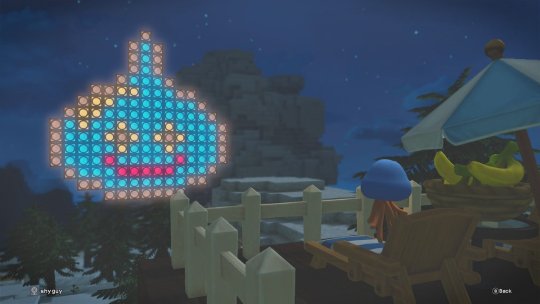
And thanks to DQB2, for the first time in 20 years I revisited my first creative endeavor: the underwater solitude bunker, this time no longer held back by the technology of the day, instead fully realized in digital form. Built as far down as the game would allow my character to dig, hidden beneath the still waters of a reservoir inside of a pyramid, it is truly a testament to mankind’s ingenuity. And it is wicked. Naturally I had my artist (and DQB2 fanatic) girlfriend visit my game’s world so she bask in my true brilliance. I gleefully guided her down to the catacombs and down the intimidatingly long chain that dangled into the deceptively still depths. After a brief swim into the murky unknown, we arrived at our hidden destination at the bottom of the earth, where she was greeted by the sight of my submerged masterpiece. A wry smile snaked itself around my lips, as I knew, was absolutely certain, that within seconds, once she had made it through the de-pressurization chamber at the entrance to my paradise, I would be hearing the words of someone simultaneously shocked, awed, and hopefully only a bit jealous. Instead, I was met with a few seconds of silence followed by a patronizing “Well, I’d have never thought to build something like this.”
So, I guess that’s why Builders 2 couldn’t quite reach the number one spot: true art is never appreciated in its time.
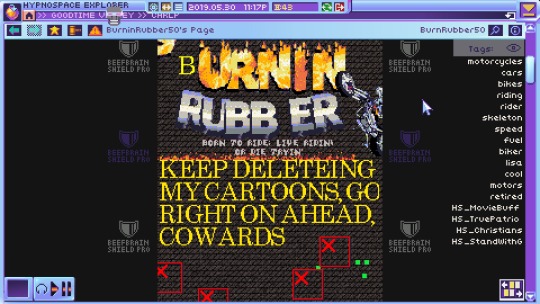
1. Hypnospace Outlaw (PC) - No piece of commercial art has ever felt like it was made for me in the way that Hypnospace Outlaw does. I grew up on the internet during the time period this game’s alternate reality take on the 90s internet is drawing its inspiration from; I have talked at length, to anyone who will listen, about how this early incarnation of the internet felt more like a physical space than it does now, and how much I miss the days of stumbling on to weird Geocities sites, meeting people in AOL chatrooms, and the early days of pirating. I met my first girlfriend through the internet, as well as my current one. The vast majority of the friends I’ve made in my life would not have happened without the internet, and not just because of distance; the internet allowed the younger me to be the person I was too insecure to be in person, and to develop my own voice. I owe who I am to the people I met in freeware fanmade Dragonball Z games and IRC chat rooms, and I think that’s kind of fucked up and magical, and it’s all kind of a miracle that I’m not even more of a mess of a person than I am today. And the developers of this game have clearly had those experiences, too.
I’m not going to sit here and tell you that Hypnospace Outlaw is for everyone, because it’s absolutely not. It’s essentially a detective game, but you’re solving cases by investigating user made internet pages circa 1997, and the “cases” you’re working on are largely things like bullying and copyright infringement. In other words, you’re mostly just reading gaudy websites and figuring out more about the back end and exploits of the Hypnospace experience. It is incredibly specific and niche and, as someone that sorely misses staying up until 3 AM downloading Winamp skins, I can’t stop thinking about this game, even months later.
I wrote a longer piece on the game on this very blog, and instead of rehashing anymore of it here, I’ll just direct you that way. Though if I may, I’d like to give one last endorsement for the game for any hypothetical person reading this that’s on the fence about trying it - if you’re the kind of person that somehow finds yourself reading this game of the year list, and have made it this far down the page without getting bored, I promise you that you’ll find something to love about Hypnospace Outlaw.
Honorable mentions (for games that were either not originally released in 2019 or I still wanted to briefly touch on):
Dragon Quest 11 S: Echoes of an Elusive Age - Definitive Edition (Switch) - Somewhere in between listing the original release of Dragon Quest 11 as my 7th favorite game of 2018 and now, it went from being “a really great JRPG” to “one of the best games I’ve ever played”, and in all honesty should have probably been at the top of last year’s list. A beautiful, unmatched experience all around.
Overcooked! 2 (Switch/PS4/Xbox One/PC) - The Overcooked games are possibly the best coop games I’ve ever played by merit of them actually requiring communication between players. Framing the game’s mechanics around cooking food, a universally understood act, is brilliant.
Baba is You (Switch/PC) - This is the most clever puzzle game I’ve ever played. Hell, it’s probably the most clever game I’ve ever played period. What prevented me from truly falling in love with it was that every single puzzle after the first couple of worlds became the hardest thing I’ve ever tried to do in my life. And while that did make solving those puzzles equally satisfying, the thought of dedicating multiple hours each to stumbling through dozens and dozens more of single screen puzzles was a bit more than I was able to handle. Still, for any puzzle fans, there are some genuinely jaw-dropping moments in this that shouldn’t be missed.
Kirby’s Dreamland 3 (Switch/SNES) - The things I didn’t like about DL3 as a single player game are exactly what makes it a great coop Kirby game, which was a way to play this game that I never had the pleasure of experiencing until this year when it was re-released on the SNES Switch app. It’s skyrocketed up my list of favorite Kirby games, as well as become my favorite SNES coop game. Also, Gooey.
Kind Words (lo fi chill beats to write to) (PC) - I don’t quite qualify this as a game, as it’s more of a message in a bottle app with a very warm and charming aesthetic. But if you’ve ever wanted to anonymously reach out to strangers and tell them things are going to be all right while listening to some calming music, this is the thing for you.
Luigi’s Mansion 3 (Switch) - I have a deep, deep fondness for all three of the Luigi’s Mansion games (the GameCube and the original game were my first launch day purchases!), and 3 is by far the best game in the series. Every single moment of it was some high degree of charming and/or cute, and it’s a game I would feel confident in recommending to just about everybody. However, while I truly loved my time with the game and will no doubt replay it years down the road, there was nothing inside of it that really left any kind of deep impression on me. It’s a summer blockbuster in a kid-friendly spooky form, and that’s great for what it is.
Super Mario Maker 2 (Switch) - Mario Maker 2, sequel to what I would consider to possibly be the best game Nintendo’s ever made, is by far and away my most disappointing game of the year. It’s still an amazing toolkit, and I’ve been very satisfied with the levels I ended up making. That said, the gaming landscape has changed a lot in the 5 years between the original and the sequel, and with Nintendo’s nigh complete silence regarding updates coming to the game, I can’t consider it to be anything but a massive disappointment. And maybe that will change! But as of this posting, there’s been almost nothing to keep me coming back to the game a mere few months into its life, and that’s a huge problem. All of that said, it’s still a fantastic game and value, especially if (like most) you didn’t get a chance to play the original due to the console it was stuck on.
1 note
·
View note
Text
Hypnospace Outlaw

Hypnospace Outlaw (PC) is, in simple terms, a game where you play a content moderator on the internet in an alternate reality 1999 in which people, by wearing a special headband, can access the internet while sleeping. Hence, Hypnospace. Navigating the Hypnospace is done by interacting with the HypnOS, a loving homage to late 90s computer operating systems. You get assigned your cases through emails from the developers, you can browse the Hypnospace with a browser (duh), and you can download various extra programs and images and music (and even viruses) to your desktop. This all essentially amounts to you being a detective, as most of your assignments will require you to track down secret pages, passwords or general information that other Hypnospace users don’t want you to find. What the game really amounts to is using your reading comprehension skills to read between the lines and some savvy browsing to figure out what makes these people tick.
This all sounds like a virtual noir thriller, and it kind of is. But the wrappings around this game are what make it such a delight. Every Hypnospace user’s page is, quite frankly, garish as hell. From copious amounts of ugly animated gifs to obnoxious (in the most gleeful, bombastic sense of the word) music playing on the background of nearly every page, these websites are just as gaudy as anyone who browsed the internet two decades ago could hope for. Because while what you’re doing is essentially detective work, you’re largely not tracking down criminals, but rather dumb teenagers drawing rude comics of their classmates, or baby boomers posting copyrighted cartoon fish detectives without permission.

With that out of the way: no other piece of media has ever made me ache for a time and a place the way that Hypnospace Outlaw did. After years of barricading my emotions and psyche (a healthy practice, I’m sure), I was finally reminded of who I was as a teenager and pre-teen - it was like running into a cousin you forgot existed years ago. I was flooded with memories of everything I used to be and the people I surrounded myself with online; otaku IRC chats filled with their own hierarchy and drama, moderators and idlers (as a 10-year-old in the year 2000, the concept of an adult who never had to turn their internet off so their family could use the phone, and thus had the capability to idle in a chat room for weeks at a time, was what I thought a person’s measure of success should be); angsty teenage authors who had yet to learn the meaning of the word “subtext’, writing stories and sharing gifs on their own Geocities sites; crushes located time zones away with multiple suggestive AIM screen names, whose conversations I used to save and fall asleep looking at; curating my tastes and helping discover my own personality by stumbling upon pirate websites and communities instead of actually interacting with other kids my age; a fan-made, online Dragonball Z game that was the first space, physical or virtual, that I ever felt like I could be myself, and full of people I still consider to be some of the best friends I ever made.
If there’s a universal motivator, I think it’s to be understood. In the year 2019, I have more people in my life that I feel understood by than I probably deserve. And without the dumb, goofy, melodramatic wild west internet of the 2000s, I don’t believe I ever would have had the privilege of knowing what that feels like. I owe some kind of life debt to the developers of Hypnospace Outlaw for reminding me of how far I’ve come, as well as for restoring my awe at the concept of being loved. And I also owe countless people across dozens of long dead websites, forums, IRC rooms and video games a thanks. I doubt any of them will ever see it, but if my time inside of Hypnospace reminded me of anything else, it’s that everything posted online will (eventually) be seen by someone who needs to see it. So: thank you all for making me, me.

Recommendations are just an attempt to have people understand you, and as stated above, I’m fortunate enough to have plenty of people in my life that already understand me. And if you’ve made it this far down the page you probably have a much better understanding of me now than you did when you started reading. Perhaps too much of an understanding. So I’ll tell you that Hypnospace Outlaw is available for a paltry 20 dollars on Steam as of the time of this writing, and that even if you have no nostalgia for that era of the internet (hereafter referred to as MY era of the internet) it’s a great little puzzle game unlike anything else I’ve ever played, and the developers deserve your money. But if you do decide to purchase it, do it at least partially for you in the hopes of discovering something new, and not solely because a normally quite emotionally unavailable 29-year-old man on the internet openly wept at his desk multiple times while writing this sappy blog post.
1 note
·
View note
Text
Goty 2k18
These are indisputably the best games of the year 2018, and no one has any right to say otherwise. Honorable mentions are for amazing games I played this year that were released not this year.
Honorable Mentions:
Hollow Knight (PS4/Xbox One/Switch/PC) - I didn’t play this 2017 release until the Switch version this year, but it’s the best game I played in 2018, and maybe the best Metroidvania I’ve ever played as well. It has a bit of a slow start in terms of seeing new areas and gaining new abilities, but stick with it and it becomes one of the most rewarding games I’ve ever experienced.
Yakuza 0 (PS4/PC) - Narrative oriented games have never been my bag, but I’ve rarely felt this invested in a story in any medium. The characters are immediately memorable, at once both over the top caricatures of goofy hyper masculinity and oddly thoughtful yakuza members concerned with their community and just being human. I’ve never seen a story so masterfully jump back and forth between overwrought anime nonsense and down to earth character beats, all while retaining its unique sense of self. It’s a lovable soap opera starring handsome criminal boys with hearts of gold, and shouldn’t be missed by anyone.
Ys VIII: Lacrimosa of Dana (PS4/Switch/PS Vita) - This series has been around for decades, and I never gave it a glance until I heard a bit of the soundtrack for this entry. It lacks polish and has a pretty simplistic combat system, at least on the default difficulty setting, but it’s one of the most interesting JRPGs I’ve ever played, as the entire game takes place on a deserted island after a ship is destroyed by a kraken-esque creature. Oh, and the aforementioned soundtrack is absolutely delightful, with cheesy electric guitars around every corner. It’s the perfect game to unwind with before bed on your Switch.
Katamari Damacy Reroll (Switch/PC) - It wouldn’t be fair for the best game of 2004 to also be the best game of 2018, so it’s been excluded here. But make no mistake, this is the best purchase you can make this year.
Actual games of the year:

12. Far: Lone Sails (PC) - I fucking love games where you operate a large vessel by controlling a small character inside of it. I’m not sure how to describe this type of sub-genre, but Dragon Quest Heroes: Rocket Slime and Lovers in a Dangerous Spacetime are the only other examples I know of. And while those are fast, goofy, frenetic and colorful experiences, Lone Sails takes the concept and applies it to a linear, artsy indie game. And it turns out, making one of “those” indie games and coupling it with a fun and relatively unexplored gameplay conceit makes for an extremely memorable experience; the first time my train-shuttle-car-thingie reached full speed as I perfectly managed my fuel, steam and acceleration is something that’s stuck with me all year. The only thing keeping this game from rising higher up this list is that I think it’s painfully short at around 2 hours long, and I say that as someone that loves shorter experiences. A more fully fleshed out sequel or spiritual successor has the potential to be considered an all-time great.

11. Donut County (PS4/Xbox One/Switch/PC/iOS) - The soundtrack for this game alone is clever enough to deserve a spot on this list, honestly. And clever is the best word to describe Donut County as a (w)hole. Having not heard pretty much anything about the game going in besides general good word of mouth, I was genuinely stunned as I realized the entire game was nothing but moving a hole around and growing bigger as I sucked up objects in a stylized world. In all respects, this game feels like the western equivalent of Katamari Damacy, though there are probably some poignant think pieces to be written comparing Katamari’s building with Donut County’s destruction. Regardless, Donut County is delightful. The humor may not be for everyone (I personally loved how accurately the dialogue captures the tone of texts between 20-somethings), but there’s something for everyone to enjoy here.

10. God of War (PS4) - God of War is interesting. It feels like a mish mash of pretty much all the non-shooter related hot trends in video games right now, and yet doesn’t really excel at any of them. The story’s fine, though I think both Spider-Man and Red Dead Redemption 2 told far more nuanced and interesting ones this year in the western-developed AAA space. The combat feels great for the first couple of hours, and BOY DOES THROWING THAT AXE AND RECALLING IT FEEL AMAZING, but encounters aren’t really changed up at all past the halfway point of the game, and the combat in general feels like it’s shown you its entire hand within a couple of hours. And yet, everything about the game is so memorable. From punching indestructible gods through mountains in the first 15 minutes of the game to hanging out with a sardonic decapitated head, I feel like this is the most I’ve thought about an action game after completion besides Bloodborne. It doesn’t hurt that this might be the best looking game I’ve ever seen, either. It might just be the meatloaf and mashed potatoes of video games, but it’s some pretty damn good meatloaf.

9. Monster Boy and the Cursed Kingdom (PS4/Xbox One/Switch/PC later) - There are plenty of sidescrolling indie metroidvania throwbacks these days. Oddly, there’s also been a fair few games in the oft overlooked Wonder Boy vein lately, the series Monster Boy belongs to. There aren’t a lot of downright pleasant games made in this style lately though, and pleasant is the perfect word to describe the time spent exploring this game. The visuals are absolutely gorgeous, the soundtrack is second only to Celeste this year, and the game somehow manages to feel like playing a Master System game without all of the drawbacks a statement like that would normally entail. What holds this game back from true greatness for me is that some of the later dungeon and boss designs are remarkably unclear in their progression, mostly the haunted mansion area. That said, these are relatively small complaints in a surprisingly large adventure, and the different animal abilities are truly brilliant. Monster Boy occupies the same space for me as last year’s truly incredible SteamWorld Dig 2, and if that doesn’t sell you on the game then nothing will.

8. Yakuza Kiwami 2 (PS4) - Everything stated above in the Honorable Mentions section applies here; Yakuza is a series about lovable handsome crime boys playing the role of boy scouts in their community, if the boy scouts kicked motorcycles at bad guys. I will say that Kiwami 2 never approaches the pure brilliance that was Yakuza 0, but most of that can largely be attributed to the fact that this game is a remake of a 12-year-old video game from two console generations ago. And don’t let that statement deter you; the story is as engaging as ever, and Kiwami 2 also shares with 0 the most fun game within a game I’ve ever played - the cabaret club management sim, which tasks you with recruiting hostesses to take on an evil circuit of club owners in a tournament of taking money from lonely Japanese businessmen. It’s as absurd as it sounds, and far more engaging than it seems, which kind of summarizes the series as a whole. My only caveat with this entry is that I would consider it absolutely crucial to play through 0 and Kiwami 1 before this, as there are some emotional seeds planted in those two games that come to tear-jerking fruition here.

7. Dragon Quest XI: Echoes of An Elusive Age (PS4/PC/Switch later) - With the sales and reception of both this and Octopath Traveler, 2018 seems like the year in which throwback JRPGs came into vogue, and I couldn’t be happier about it. I grew up loving the genre, but post high school my love largely faded for any of them that weren’t Pokemon or Mario adjacent. While I still think there’s a lot of self reflection for the genre to accomplish that Dragon Quest is existentially incapable of doing (as its own design and fandom have prevented it from making any meaningful mechanical progression in decades), DQ11 succeeds in that it’s just a really fantastic video game. Its story is always captivating and repeatedly goes in directions I never expected. Its characters are simple and painted in broad strokes (I mean that in the best way possible) while remaining some of the best written and most engaging party members I’ve ever encountered. And its battle system is oldschool, somewhat archaic and even punishing without ever feeling unfair, and it has just enough new mechanics to constantly give the player a wider swath of options than the series has ever had before without relinquishing the series trademark simplicity. It’s the most I’ve enjoyed a tradition JRPG since Chrono Trigger, and I was never once bored in my 70+ hours of playtime. Really, the only complaint I can level against the game is that the series composer is a monstrous piece of homophobic trash that deserves to be launched into a brick wall via trebuchet.

6. Mega Man 11 (PS4/Xbox One/Switch/PC) - Who would have imagined that a new Mega Man game under contemporary Capcom could end up being great? The soundtrack is extremely disappointing and the Wily stages are a series lowpoint (especially when compared to the previous two Mega Man games), but everything else in this game is operating at heights the series has never previously achieved. The mark of a good Mega Man game is how versatile the robot master’s weapons are within the actual platforming segments, and 11’s level and enemy design are completely built around using these weapons and the new double gear system as well, which allows a player to increase their firepower or slow down time at will. Every ability is not only useful but fun to use as well, even the obligatory shield weapon. Much like what last year’s Sonic Mania did for Sonic, there has never been a better time to try out Mega Man.

5. Call of Duty Black Ops 4: Blackout (PS4/Xbox One/PC) - The way in which the battle royale genre has overtaken video games is remarkable, though not as remarkable as the fact that a Call of Duty game is being included on one of my game of the year lists. I could go deep into how Blackout feels like a best-of compilation for the genre, or how remarkable it is that it retains the goofy, unpredictable nature of PUBG while actually feeling like a polished video game. But what’s most notable about the game for me is just how much fun I’ve had playing it with my friends. Video games mean a lot to me, and having a game in which our party chat can go from discussing poor life choices made by people we know to yelping as shots soar over our head as quickly as it takes for an armored truck to appear outside the house we’re hiding inside of is something truly special, and it’s something I’ve only encountered with this genre of games. Blackout may not add much of its own flavor to battle royale, and what little is there (the perk system and zombies) feels either broken or weirdly inconsequential. But sometimes, a less broken game with a slightly faster pace is all you need to become the most playable game of the genre, as well as the most I’ve ever enjoyed a multiplayer console shooter.

4. Super Smash Bros. Ultimate (Switch) - Smash is my all-time favorite multiplayer series, so the biggest character, stage and music roster to date makes this entry a no-brainer. I mean, I could spend multiple paragraphs absolutely gushing about how excited I am for all of the love the Castlevania series (another all-time favorite video game franchise) has received here alone. And that’s kind of the point. From Isabelle’s accidental murder sprees to K. Rool’s big belly rude boy moveset to Kirby sporting a beard after eating Solid Snake, with Ultimate it feels like nearly anyone that has ever played a video game can find something within that brings a smile to their face. And this is to say nothing of the over 1200(!) “spirits” in the game, all referencing even smaller and more obscure video game things. Will the game have an interesting competitive scene? I think so; I’m no pro, but the game feels so much better to me than any game in the series post Melee. Only time will tell how fun of a tournament game Ultimate ends up being, but as a celebration of the medium as a whole, this is a love letter to nearly all corners of the industry, no matter how niche. And that’s where my love of Super Smash Bros. has always stemmed from - its unflinching love and celebration of the things in my life that I love and want to celebrate. Plus, there’s Castlevania stuff in this one.

3. Tetris Effect (PS4) - Positivity in my life has been in short supply the past couple of years. To be more straightforward, the world has been an absolute fucking nuclear wasteland of hopelessness for the past couple of years. Hell, there’s an argument to be made that it’s been on this level for a while, and it’s my privilege that has prevented me from seeing that, which is even worse. My eyes have been opened, they cannot be closed, and while part of me wishes they could be, most of me can only stare with a grim sense of foreboding and wonder where the hell we’re going and how we fix all of this. So, Tetris then.
Tetris is simple and Tetris can be overwhelming. Add psychedelic visuals, space- Enya-world music and the option to experience it all in virtual reality, and you have something simple, something overwhelming, and something oddly powerful. To say I had an emotional response to Tetris Effect is an oversimplification. Losing myself inside of my VR headset to clearing lines while dolphins made of light surrounded and splashed around me was beautiful, ridiculous, cheesy and, somehow, empowering. I’m under no illusion that the world is going to get better while I hide inside, literally blind to everything going on around me, and no one should be. But the best art never was able to save us; it reminds us of what there is to lose and why the things we love are worth fighting for while also giving us the strength to do so. This sounds like a lot for what basically amounts to Tetris with cool music and visualizers, and I get that. But while writing and editing this piece, not only do I not feel like any of this has been hyperbolic per my experiences, re-reading my own words really just makes me want to play some more damn Tetris Effect.

2. Celeste (PS4/Xbox One/Switch/PC) - If Tetris Effect is your overly positive friend that can seemingly never be brought down by anything, Celeste is the friend that’s been through more than you could ever imagine and came out through the other side a better person, and not only knows you can as well, but actively pushes you to be the best you can be. This is both narratively true, as the surprisingly great story deals with depression and self-loathing and overcoming anxiety, but also what the game beats into you through your own act of playing it. Well, “beats into you” might be putting it lightly; “gently yet forcefully stabbing into you” is a bit more accurate. Yes, the game is an unbelievably hard platformer (at least on the B and C side levels), and it does take a lot of inspiration in its design from fellow platformer classic Super Meat Boy. But while Meat Boy makes your repeated deaths part of the punchline, Celeste prefers those failures to be recontextualized as experiences to be learned from. “You’re going to beat this level, and you’re going to beat this game. Just keep trying.” is what Celeste wants you to take from its harsh design. And maybe that kind of motivation doesn’t work for everyone, but the people that stick with the game found what will go down as one of the all-time greats in the genre, and certainly one of the best games of the decade.
Oh, and the soundtrack is fucking incredible too.


1. Monster Hunter World (PS4/Xbox One/PC) and Monster Hunter Generations Ultimate (Switch) - I knew something special was happening when I saw multiple Playstation friends who usually only play Call of Dutyand sports games devoting dozens (or even hundreds) of hours to Monster Hunter World this year. I was skeptical, having tried to get into the series previously on the 3DS, but something just clicked this time that hadn’t before, and soon I was farming Nergigantes for entire evenings. The game was full of nothing but memorable moments, but realizing for the first time how the insect glaive worked and flipping through the air whacking a giant electric flying squirrel as we were both being chased by a fire breathing t-rex was the most out of control I’ve ever felt playing a video game while simultaneously being the coolest thing I’ve ever done in a video game. And to revisit that same scenario over a hundred hours later, armed with the knowledge that only experience can give of how to actually control my insect glaive flips, was one of the most rewarding experiences I’ve ever had. All of the knowledge gained from World was then taken to MHGU on the Switch later this year, where my girlfriend and I put over 200 hours in and still have not seen all of the content within. If two grown adults sitting in a hotel room and screaming with delight when they see how cool the weapons they can forge from hunting a bubble dragon are isn’t an indication that their families should seek help, it means that Monster Hunter is pretty great.
So which game is better? My heart of hearts tells me World wins out by an inch for its extremely intelligent streamlined design and accessibility, but MHGU has dozens and dozens (and dozens and dozens) of different monsters to hunt and hundreds of weapons and armor sets to choose from, and having a full blown Monster Hunter on a portable with a decent screen and dual analog sticks is a great argument for the Switch entry. Really though, it doesn’t matter; these are both amazing games, and I wanted to give them both their due without using two slots. If weirdos on your friends list you haven’t talked to since high school who usually only buy FIFA can fall in love with Monhun, so can you.
1 note
·
View note
Text
GOTY 2017
Hey y’all, it’s time for my third annual game of the year list. I hope it’s not too boring or longwinded. I also hope you don’t go into this expecting reviews of each game; with very few exceptions this list isn’t going to go into deep dives about individual game mechanics or plot beats, and I also don’t bother explaining highly specific video game terms and genres that the lay person isn’t going to be aware of, which is more down to this seeming too long already rather than apathy on my part. Discussion or questions are very welcome! Anyway, before we get into the actual top 11, here’s a couple games that didn’t quite make the cut that deserve to be talked about, as well as some housekeeping as to why some pretty big games aren’t included elsewhere on the list.
Some friends and I are also looking into doing a podcast later on to talk more in-depth about our lists, as well as maybe some other year end awards-y type things for other categories in games. Anyway, here we go.
Games I haven’t gotten to yet: Ruiner, Pyre, Prey, Yakuza 0, Hollow Knight, Hellblade
Don’t @ me I’m sleeping: Resident Evil 7, Persona 5, Mario + Rabbids, PUBG
Special shout outs that didn’t make it to the actual list but are still good, quite good!:
Snipperclips: Cut It Out Together (Switch) - Absolutely everyone that owns a Switch and has someone to play co-op games with should buy Snipperclips, be it significant other, child, sibling or roommate. It’s a game where you each play as two pieces of paper that have to cut each other into different shapes to solve various puzzles, and it’s even way more fun and goofy than that description makes it sound. If I had been able to put more time into this game it probably would’ve made the actual numbered list.
Wolfenstein 2: The New Colossus (PS4/Xbox One/PC) - Wolfenstein’s story about an alternate 1960s where Germany won World War 2 and occupy America was so absolutely fucking bonkers and fun while at the same time bleakly sad and interesting. It’s a shame the actual game isn’t very fun to play, but this absolutely deserves mentioning somewhere. Get fucked Nazis.
Horizon: Zero Dawn (PS4) - Horizon has maybe the most interesting and well told story in any big budget, non-indie game I’ve ever played. It’s also maybe the best looking game I’ve ever seen, especially running in 4k. It’s a shame it released so close to Zelda and Nier, since I feel it’s going to be overlooked in a lot of other GOTY lists, but it’s absolutely worth playing. Also the main character, Alloy, is really fun and tells weird kings to fuck off when they try and hit on her.
Aaaaaaaand here’s the actual list this year:

11. Night in the Woods (PS4/PC) - More games should address mental health. I think the medium is especially suited for not only discussion of the matter, but potentially as a teaching tool as well. It’s especially neat in Night in the Woods because of its slice of life, shitty rustbelt town in fall atmosphere. The main character, Mae, is an unexplained college dropout that returns to her hometown to hang out with friends, and discovers that they’ve all started making progress towards various goals in life while she has largely languished. It’s a very personal and sweet story about reconnecting with your roots and rebuilding connections with loved ones, all while surreal shit is going on in the background and it’s always kind of unclear what Mae is actually suffering from.
I would be remiss if I didn’t mention that, much like Life is Strange (PS4/Xbox One/PC) before it, what starts off as a very simple and charming slice of life game eventually strays into much bigger, cosmic scale ideas, and it kind of feels out of place. Still, I was never bored or driven to the point of rolling my eyes, and I’ve never played a game with more realistic dialogue between goofy and awkward punk rocker friends. The fact that everyone is an anthropomorphic animal for no reason other than to make it look cuter is a huge boon as well.

10. Shovel Knight: Spectre of Torment (Switch/PS4/Xbox One/Vita/PC/Wii U/3DS/PS3/Xbox 360) - The original Shovel Knight was a very cute, very charming, very ok game. It never blew me away the way it did for other people, despite the fact that it seemed tailor made for me, but it was still pretty dang good. The two expansions, however, have been far more interesting games, and Spectre of Torment in particular is a love letter to the original Mega Man X (SNES), a game which has weirdly never had its formula and feel replicated or expanded upon. Having full freedom to select which order to complete stages, as well as finding hidden doodads within that let you purchase new weapons, really maximizes the replay value. Add to that a completely remixed soundtrack that’s way more fun and melody driven than the original, and you have maybe the best action platformer since Mega Man 9 (Wii/PS3/360).
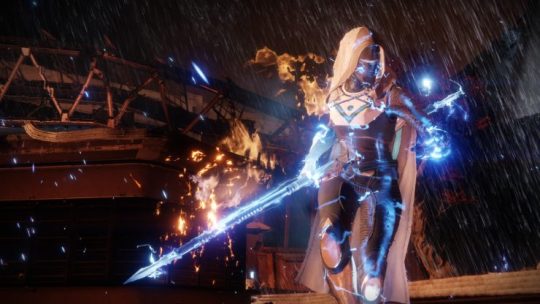
9. Destiny 2 (PS4/Xbox One/PC) - I think Destiny 2 represents pretty much everything I hate about modern game design - approximately 8,000 unique currencies all with their own uses; different classes and subclasses that in broad strokes don’t feel any different from each other; no real sense of progression aside from seeing a set of numbers arbitrarily rise; needlessly large worlds that aren’t fun to explore; a heavy emphasis on story when the story is complete fucking trash; etc. And yet I still put dozens of hours into the game.
It’s a dumb game and I am a very dumb person. That said, despite the constantly online, shooter focused nature of the video game industry, there really aren’t any other shooters so devoted to cooperative play on a scale larger than team versus modes. I can’t think of a game that’s had more fun co-op in recent memory, and that’s enough to make up for the mediocre pomp and frills surrounding the actual game. Who cares that Destiny is borderline predatory when my friends and I are throwing lightning grenades at shadow emperor space worms?

8. Metroid: Samus Returns (3DS) - At one point in time I’d have considered metroid my favorite game series period, so watching its decline over the past decade has been particularly painful. I wouldn’t say this half remake, half new game is an unmitigated success. But for an outsourced, low budget, sidescrolling entry in 2017, a time in which the indie scene has completely taken over the space metroid used to occupy, Samus Returns is an admirable experiment.
Unlike most, I think making the game more combat focused than any previous metroid is actually a wise move, especially considering the developer pedigree; Mercurysteam, despite any other faults, has proven that they can handle designing engaging combat mechanics. And weirdly, even though the main heroine is a 6 foot tall amazonian space goddess with bird alien power armor and a cannon arm, the series has never had engaging combat encounters before this. The game definitely lacks some of the atmosphere that the series is renowned for, but it’s hard for me to fault the game too much for what it isn’t when what we have is an interesting interpretation of a classic game and a new entry in an amazing series that has been dormant for too long.
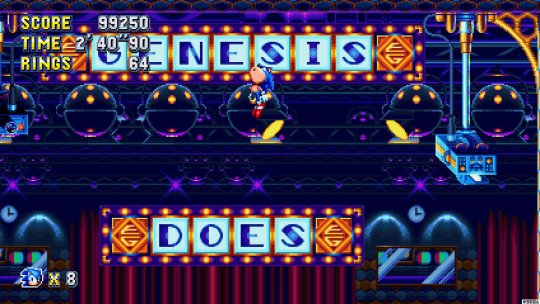
7. Sonic Mania (Switch/PS4/Xbox One/PC) - Sonic was never really that good, even the Genesis era games that people hold in such high esteem. I’m actually of the opinion that, prior to Mania, Sonic Colors (Wii) was the best game in the series - the gameplay possibilities added by the wisps felt right at home in a Sonic game, while not feeling like a cheap gimmick. Generally speaking, the original Sonic games feel far too simplistic in terms of the verbs available to you to compete with anything like Mario. And while Mania doesn’t give Sonic any new verbs besides a variation on spin dashing, the level design is so creatively above and beyond anything previously seen in the series that it feels like an entirely different beast. Honestly, chemical plant zone alone has more creativity in its two acts than the entirety of any previous 2D Sonic game, and that’s before it culminates in a freaking Mean Bean Machine battle against Robotnik. I liken Mania the most to Donkey Kong Country Returns (Wii) in its ability to capture everything that the previous entries in the series were known for while still being able to modernize its design.
Despite all of that, the best part of Mania is its unflinching devotion to its aesthetic. It truly looks like a long lost Sega Saturn game. And while the soundtrack isn’t quite as slavish to what came before, I don’t think I’ve had a more dumb grin on my face this year than when I heard the calypso style Green Hill zone remix for the first time. Mania is a celebration of all things Sonic the Hedgehog, which means different things to different people. To me, what the game most loudly celebrates is the untapped potential of a tragically mishandled series. Consider this game the fulfilment of a promise the series originally made nearly 30 years ago.

6. Splatoon 2 (Switch) - If I’m being completely honest, Splatoon 2 is making it this high on the list almost solely for how fun the new four player cooperative mode, Salmon Run, is. You get stranded in various locations to take on hundreds of slimy zombie-esque salmon while terrifying horror movie music plays and you send out unheard pleas to the universe that you were paired up with players that actually know how to use the charger weapon (Splatoon’s equivalent to a sniper rifle that apparently takes more skill to wield than an actual real world sniper rifle based on my dozens of hours playing).
Salmon Run is fucking incredible. The rest of Splatoon 2 is also really quite fun to play. However: Nintendo is still so stubborn or incompetent or both when it comes to online play that any amount of fun you have with friends outside of Salmon Run is usually punctuated with spikes of rage the likes of which I’ve never experienced.
You can join your friends and play turf war (the standard Splatoon battle mode) pretty effortlessly at any point.
That’s good!
Every single match you play assigns you both to random teams, meaning you’re not always actually playing on the same team as the friend you’re attempting to play with. In fact, I swear there’s some kind of algorithm going in that actually assigns you and your friend to opposing teams more often than not.
That’s bad!
There is a mode where you can play with a dedicated team of two or four people, paired up against other groups of two or four.
That’s good!
It’s actually a ranked mode which is where all the professional Splatoon teams that stream on Twitch for hours everyday hang out, so you’re more than likely going to be facing off against a team of people who are so good at the game they make money off of splatting.
That’s bad!
Every few weeks there are big game-wide events called Splat Fests where each person chooses between two options, and then represents their selection and are paired up against players from the opposing team. These can range from pretty basic, such as cats vs dogs or ketchup vs mayonnaise, to the extremely goofy like Spongebob vs Patrick. Also, the music and backdrops of levels completely change during Splat Fests; all the levels are changed to take place at night, and you’re treated to ‘live performances’ of squid pop music. You even get exclusive in-game t-shirts based on the team you picked.
That’s good!
But your ability to play with friends during Splat Fests is even further restricted, limiting you solely to the aforementioned ranked mode. It’s to the point where it almost feels like Nintendo would just prefer you to play by yourself against strangers in some weird joyless, lonely world, which feels entirely counter to the kinds of games the company makes.
………..can I go play Salmon Run now?
I hope that this entry doesn’t come across as too negative, because despite all my personal frustrations with how Nintendo completely mangles their own online modes, the game is an absolute blast to play. And Salmon Run really is good enough to make up for a lot of these shortcomings! I just hope a Splatoon 3 really changes pretty much everything about the interface surrounding the game; we could really have something absolutely amazing if that were to happen, instead of a really fun game that has to be talked about with asterisks.

5. Steamworld Dig 2 (Switch/PS4/Vita/PC) - In a year that brought us the first new Metroid game in the better part of a decade, I never would have expected the best metroidvania style of game in 2017 to be a sequel to a pretty lowkey indie game that seemingly flew under the radar of the vast majority of both the industry and fans. I played the original and enjoyed it for what it was, but I never would have imagined that a sequel would be hanging so high up a game of the year list. And yet, it’s the best one of these in quite a few years, handily beating out recent darlings of the genre Axiom Verge (which was pretty ok) and Ori and the Blind Forest (which was really great). This mostly comes down to the new abilities you get in Steamworld; they’re not trying to subvert your expectations and knowledge of metroidvanias like a lot of recent games. Nope, you’re getting a damn grappling hook and jetpack. But these are the most satisfying and friendly grappling hook and jetpack mechanics in video games in a very long time. The game just has a very friendly vibe in general, from it’s warm, beautiful visuals to its amazing soundtrack. Even its upgrade system is extremely pleasant and forgiving, allowing you to swap out upgrade cogs with no fuss or punishment.
I’m also fully aware that Steamworld doesn’t quite fit into the metroidvania bubble; you’re constantly digging downward as opposed to exploring and re-exploring labyrinthine spaces looking for missile expansions, to the point where it’s almost a sidescrolling dungeon crawler. However, I think calling it a dungeon crawler is doing it a disservice due to certain connotations with that term. All you need to know is that if you’ve already finished Mario and Zelda on your Switch and are wondering what’s next, you can’t do any better than this.
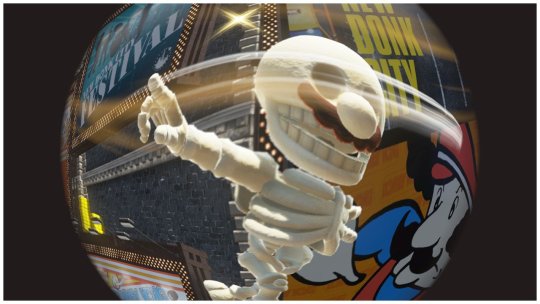
4. Super Mario Odyssey (Switch) - It actually hurts my soul that a brand new 3D Mario game isn’t even in my top three games of the year. Especially since it’s a really good Mario game! Most of that is down to just how stacked 2017 has been, but it’s also down to some disappointments I have with Odyssey. Let’s just get it out of the way - there really isn’t a whole lot of high quality platforming in the game. I went in expecting this from the moment the game was announced as a return to the exploratory style of Super Mario 64 (N64), but even adjusted expectations couldn’t assuage my disappointment in those regards after playing the game for a few hours; Mario is so fun to control in Odyssey, and has such a wide array of moves at the player’s disposal, that my soul aches thinking about a hypothetical version of this game with devious platforming on the levels of Super Mario Sunshine (GameCube). Despite all of that, you can dress Mario up as Don Draper and ride a moped as a t-rex chases you down an alley.
So the level design never even begins approaching manic perfection of Super Mario 3D World (Wii U). It’s hard to be too upset about it when you start to realize just how dense with content every single area in Odyssey really is. When you first touch down in each kingdom, you can barely take 10 steps from your ship without stumbling onto a handful of moons. And what the game lacks in regards to its dedicated platforming challenges, it makes up for with the fever dream of creativity that is allowing the player to throw Mario’s cap at dozens of different creatures and possessing them, each with their own unique controls, movement and abilities.
And look. Even though I’m sorta full up on nostalgia for 8 and 16-bit games at this point, I absolutely am ready for nostalgia for Playstation 1 and Nintendo 64 games, which Odyssey is hopefully kicking off here. I was six-years-old when I played Mario 64 for the first time, and as hyperbolic (and maybe sad) as it sounds, I consider clumsily using an analog stick for the first time to try and make Mario climb trees outside of Peach’s castle to be one of the defining moments of my life. Without spoiling anything, there are a couple moments in Odyssey that brought me hurtling back to that time in my life that nothing has been able to previously. It’s absolutely worth buying a Switch for just to experience Odyssey, despite my opening volley of complaints. Just feel free to stop well before you find all 880(!) moons if you want to leave with the best possible impression.
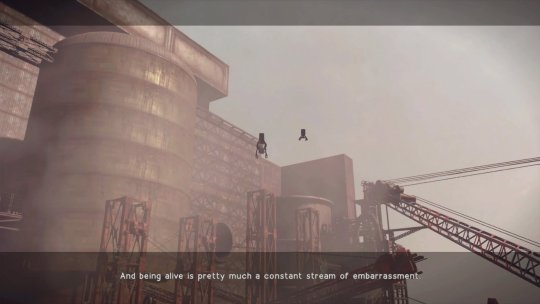
3. Nier: Automata (PS4/PC) - Generally I don’t consider myself a particularly intelligent person, at least in the grand scheme of things. But by and large, talking about games, especially the kind I like, is a pretty straightforward affair (“Kirby pilots a mech in this one!” “This is a dual ghost fairy type that dresses itself up like Pikachu to trick humans into loving it. Oh wow.”). With Nier though, I find myself mostly feeling intellectually incapable of talking about its story and themes in any meaningful way beyond that a game has never made me feel the way this one did. And maybe not being tempted to make a fool out of myself by talking about things above my education level is for the best, because I would consider being spoiled on such an amazing game in some idiot’s end of year list to be a true shame.
Nier might look like typical anime goofiness on the surface, what with blindfolded french maid sexy butt android fighting wind up toys with a katana. But the game is fully self aware of every single trope it uses, including all of the questions it asks about existence and humanity. It goes some places and has some things to say, man. The one message I feel comfortable in talking about that the game espouses: being human essentially means being in a community and taking care of one another. This is exemplified in what was, for me, maybe the most stunning moment I’ve ever experienced in a game, and during the end credits no less.
This has been a very hard year to be a human living on planet earth. And though Nier is unflinchingly bleak, the overall message of hope and positivity beneath the surface was something that I personally needed. There has never been anything else like this game, and though there are certainly better playing games in 2017, I don’t know if anything will emotionally stick with me the way Nier has.
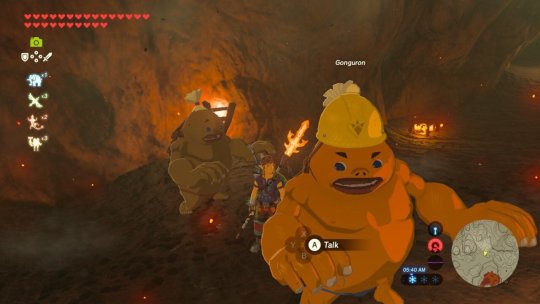
2. The Legend of Zelda: Breath of the Wild (Switch/Wii U) - Not since I was a teenager with nigh unlimited free time have I been so enraptured with a video game like I was with Breath of the Wild. I put 60+ hours into the game in the first week it was released; it was like Zelda became my second job, only I was being paid in korok seeds and bloodshot eyes. And I say all of that as a person that considers the Zelda series pretty low on my personal Nintendo franchise totem pole!
What Nintendo was able to do with the open world genre, a type of game they’ve never touched before, is nothing short of remarkable. Most ‘open world’ games are open world only in the sense that there’s a lot of empty space to drive around in to get to an arbitrary objective marker, with no mechanics to give players a way to actually have fun in all of that space. Zelda lives and dies by how the world reacts to everything the player (and enemies) are doing. Sure, there’s simple examples like rolling a boulder down a hill to kill an unsuspecting group of enemies. But getting into a battle with enemies shooting fire arrows at you on a grassy plain, having the hill catch fire, and then escaping after realizing that the wildfire has created warm air that can push you on your paraglider up and out of harm’s way is one of the most amazing moments I’ve ever experienced in a game.
There are definitely issues with the game. For a game with so much time spent in menus, you’d think Nintendo could have come up with a far less cumbersome menu navigation method. And I do very much miss having full length Zelda-styled dungeons (though I do think breaking them up into 120 individual puzzles is a very interesting design decision that totally fulfils its intended goals). It’s easy for me to ignore a few rough edges in a game that made me totally forget what it meant to live life away from a TV screen for an entire week, though.
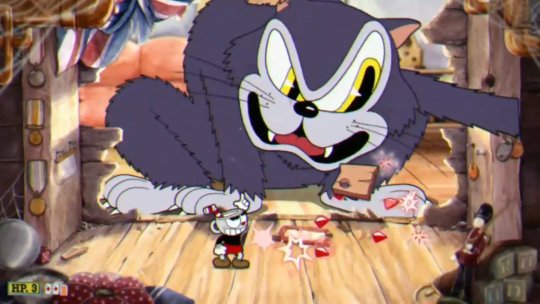
1. Cuphead: Don’t Deal with the Devil (Xbox One/PC) - I hesitate to call many things, in any medium, “perfect”. And when I do, it’s things like Shaun of the Dead. No, Shaun is not high art in the slightest, but I can’t think of any other movie that so deftly delivers on its intent while making it seem effortless. With the way modern video games are developed, my ideal of perfect (besides being as subjective as it can possibly be) seems nigh unattainable; how is a consumer product that’s touched the hands of hundreds, if not thousands, over the course of years of development supposed to sustain a singular, unified vision across the entire experience? Even the two best games of the past few years, Bloodborne (PS4) and Super Mario Maker (Wii U), really fall flat on their faces in certain regards, albeit in completely different ways. Make no mistake: Cuphead is the perfect video game, as well as the best game in maybe the best year for video games ever.
It’s not just the game’s tireless devotion to the “rubber hose” era of animation. Nor is it just how the game’s biggest video game inspirations, Gunstar Heroes (Sega Genesis) and Punch-Out!! (NES) are in and of themselves two perfect action games. The combining of a long dormant style of art with a (mostly) dormant style of games is genius in a way that makes everyone else seem dumb for not thinking of it first. Cuphead feels like something that came from an alternate timeline where polygonal games never became the norm, but art in games continued to grow and evolve, unlike other contemporary retro-styled affairs. Which isn’t meant to disparage games of that ilk, but rather emphasize how Cuphead somehow manages to succeed as a game that owes a lot to works that came before it, while also not relying on direct references to, and nostalgia for, those inspirations. The references and nostalgia are there of course, but aren’t needed for the game’s accomplishments to be appreciated by just about anyone.
Put all of that aside though, and what you have is a really fucking fun game where you get to shoot anthropomorphic waffles with magic finger guns. And it has cooperative play! In fact, the only bad thing that can be said about Cuphead is that the second playable character, Mugman, is relegated to player 2. Maybe ‘perfect’ was a tad hyperbolic.
1 note
·
View note